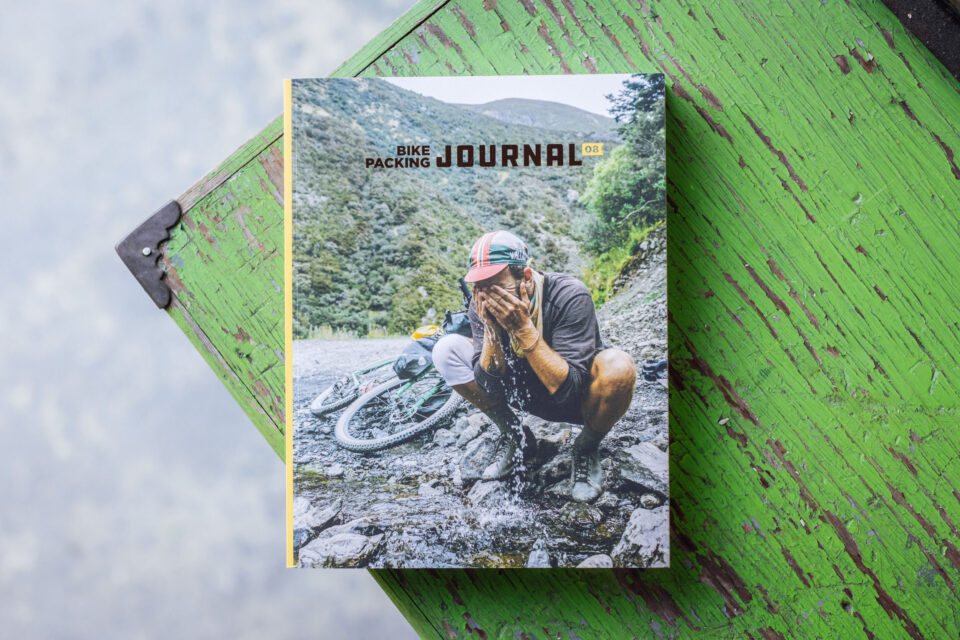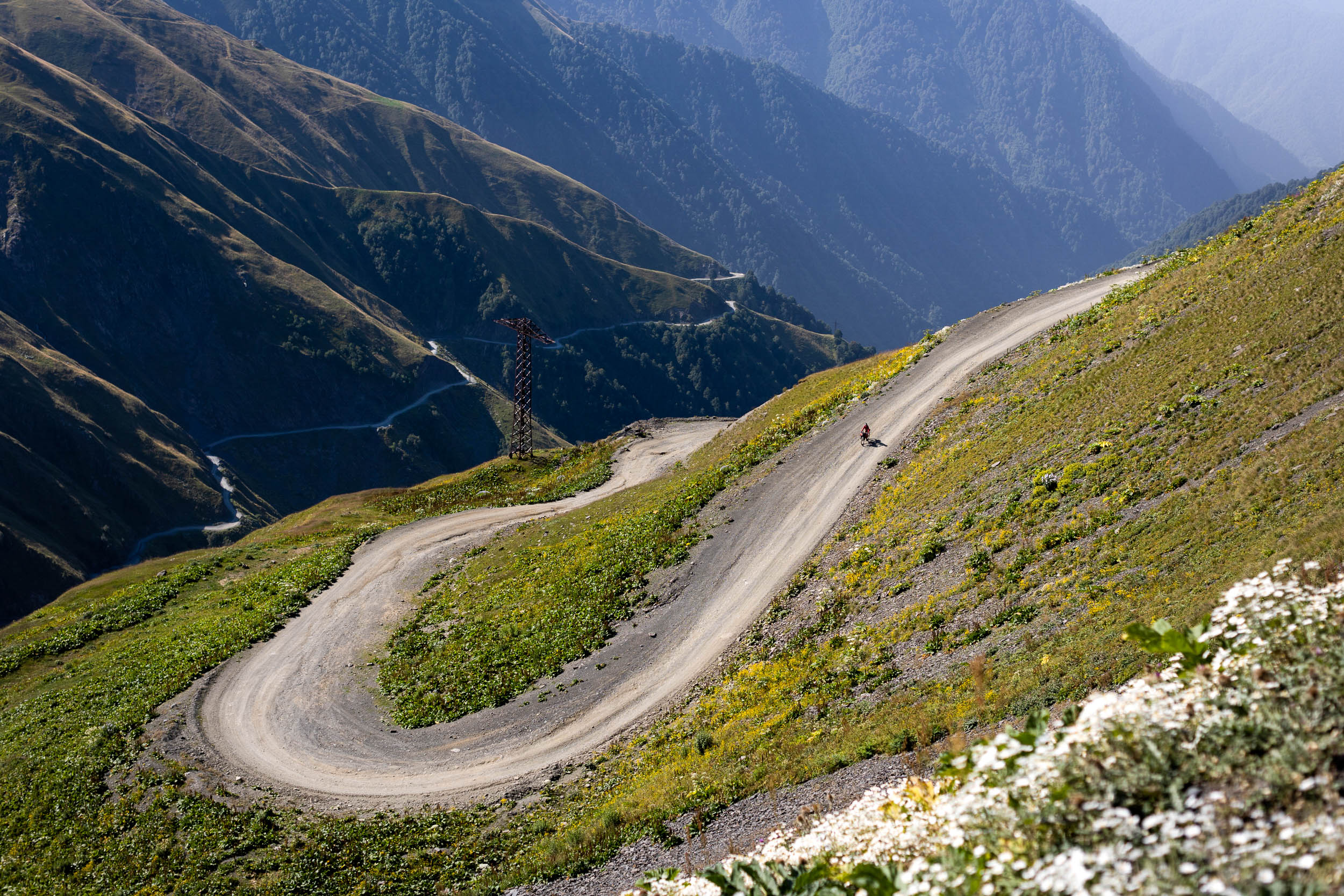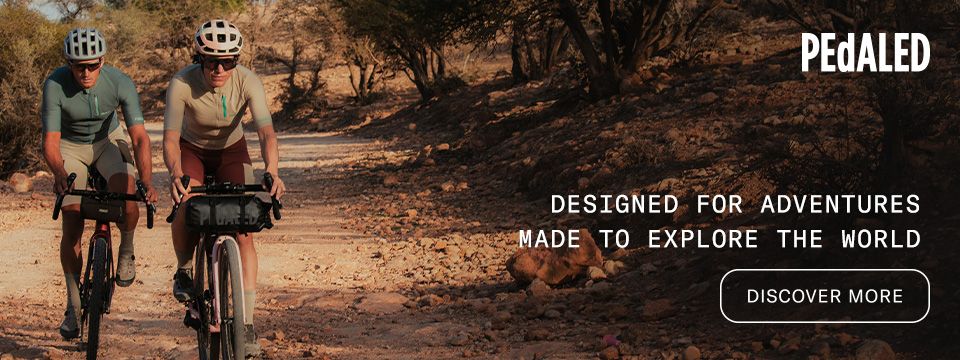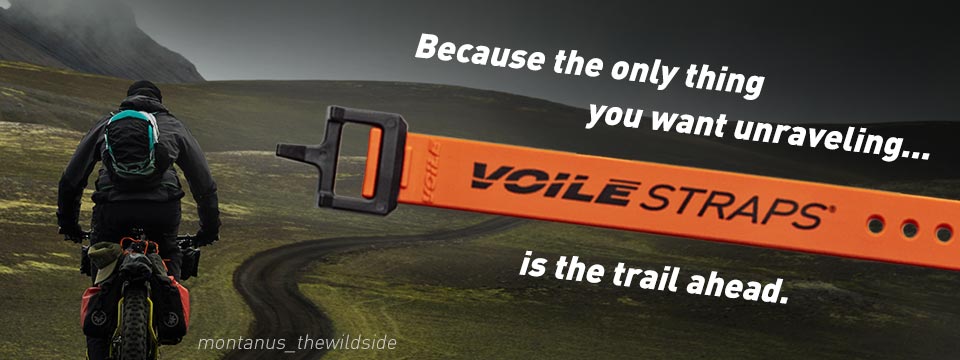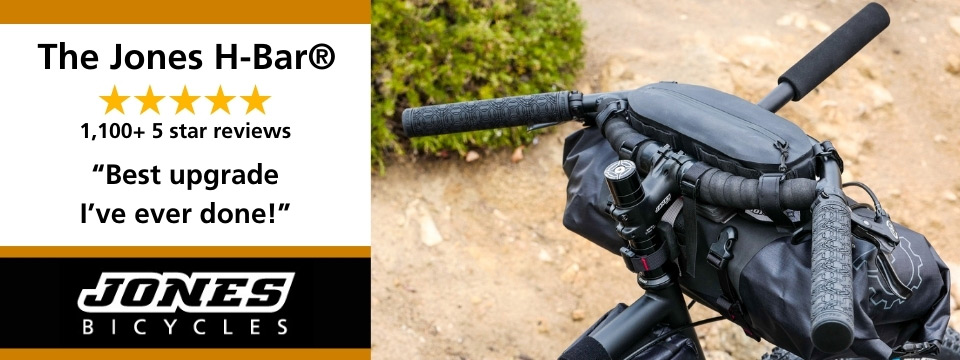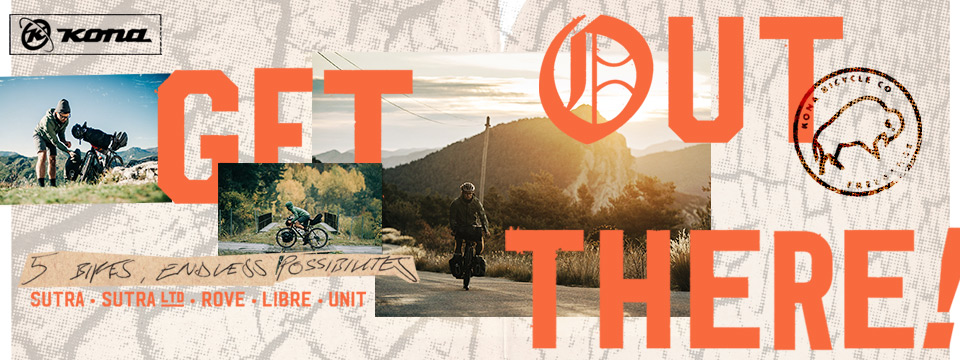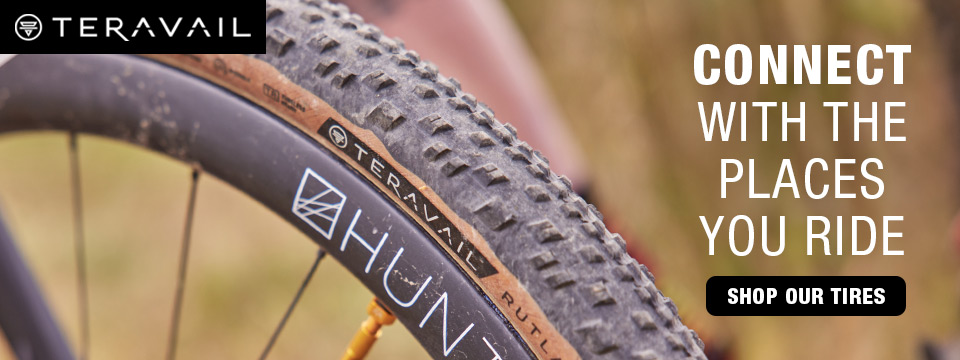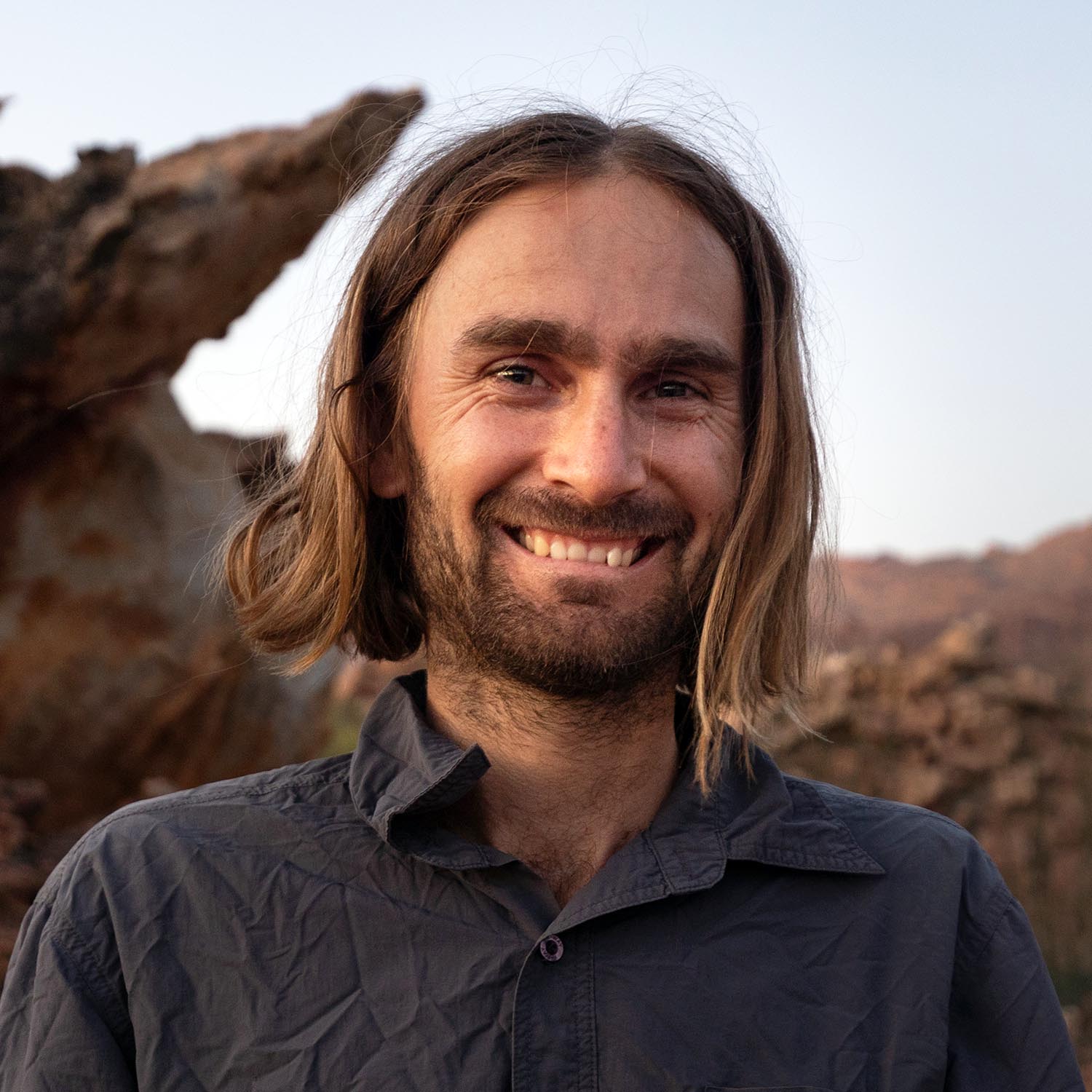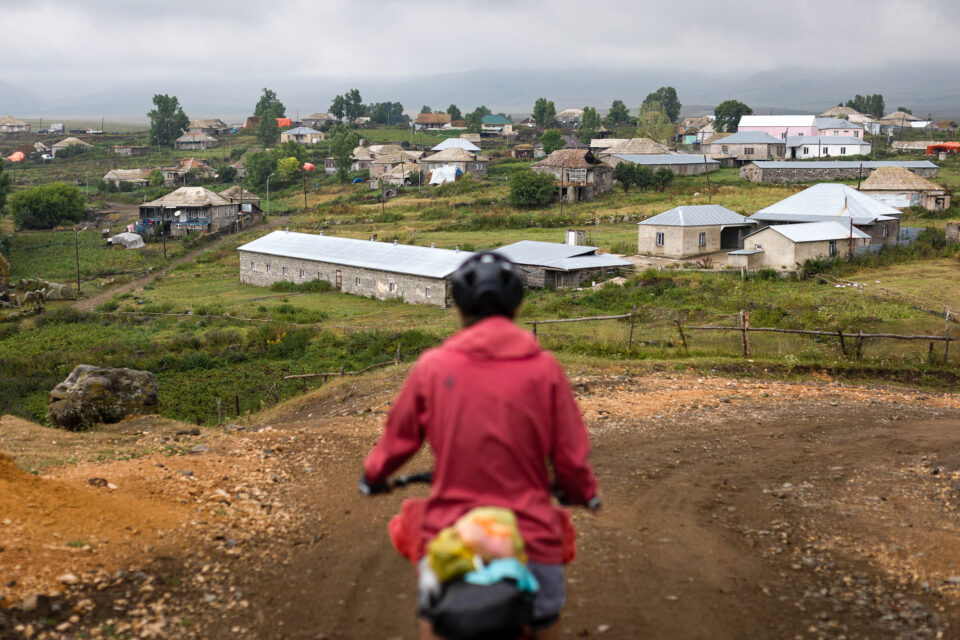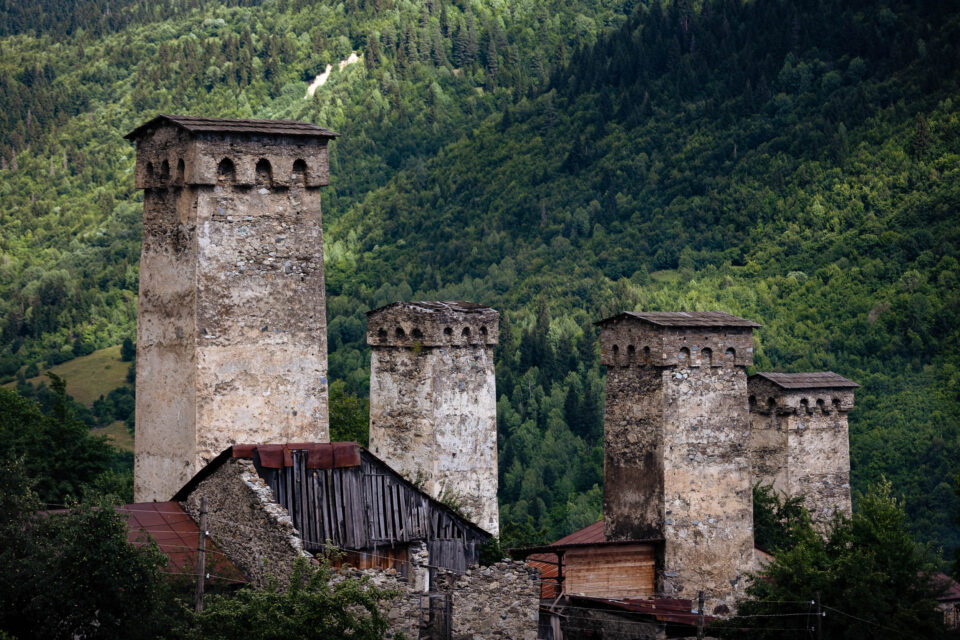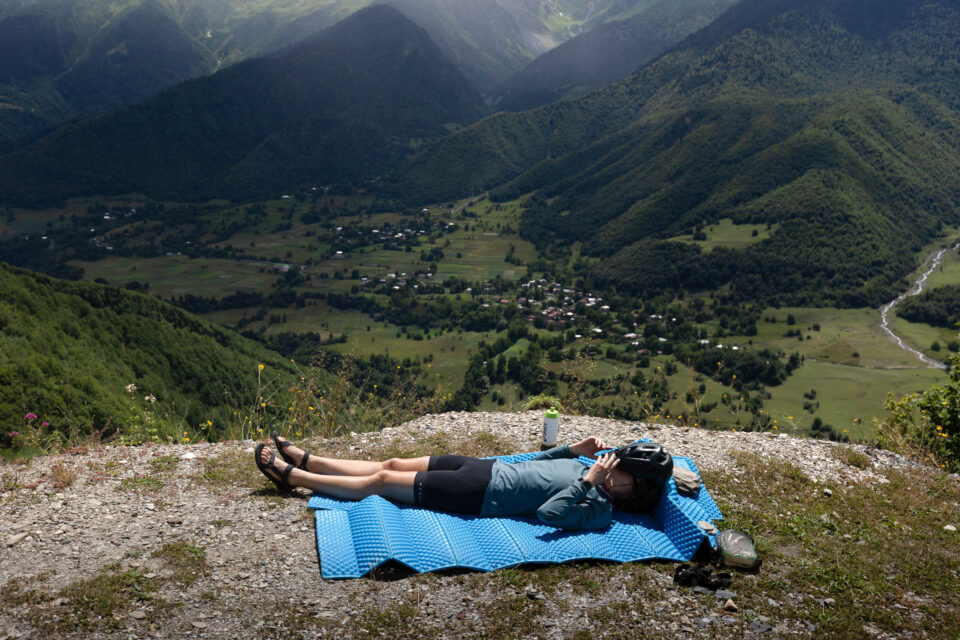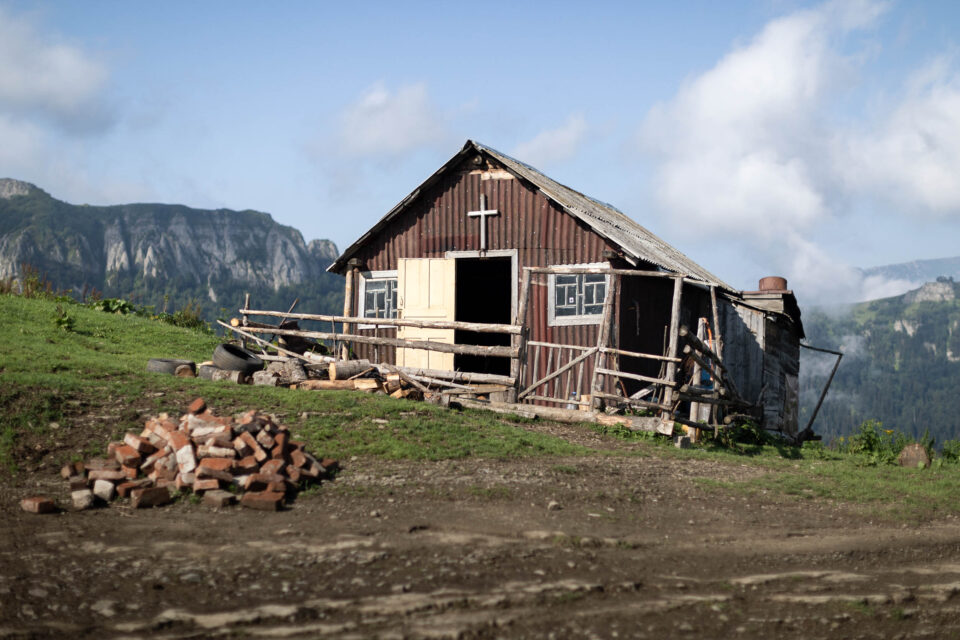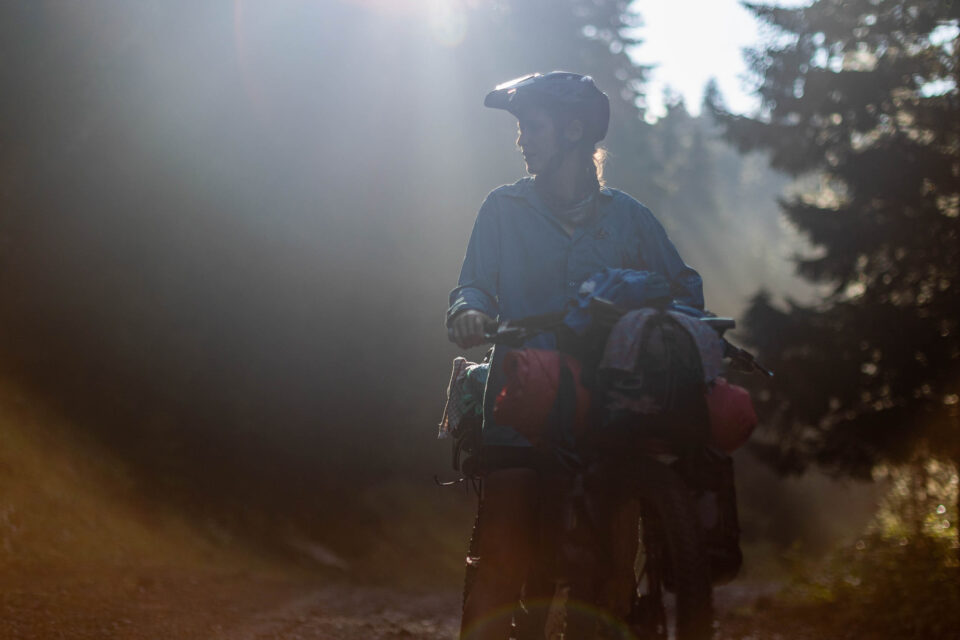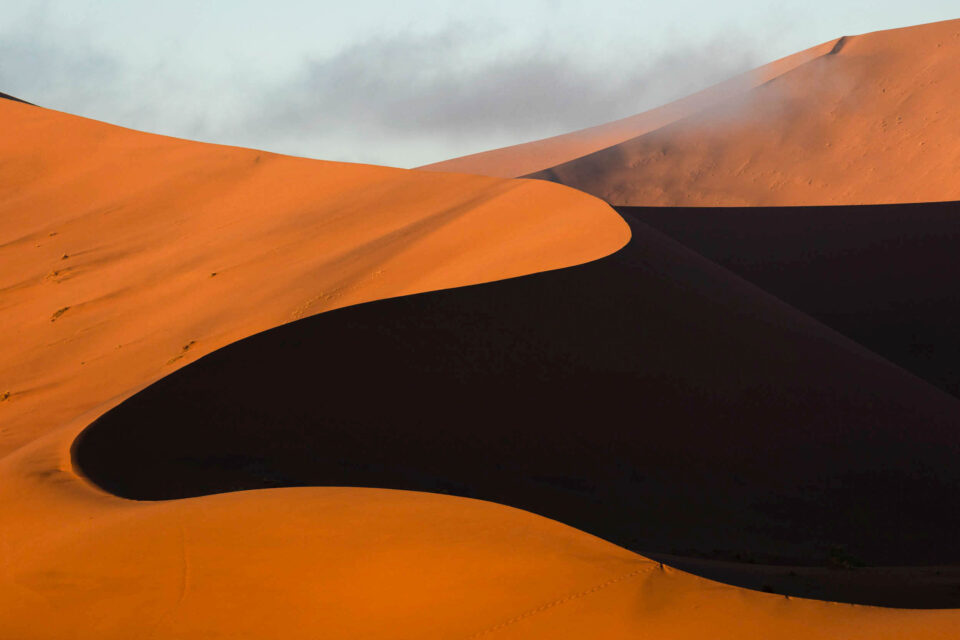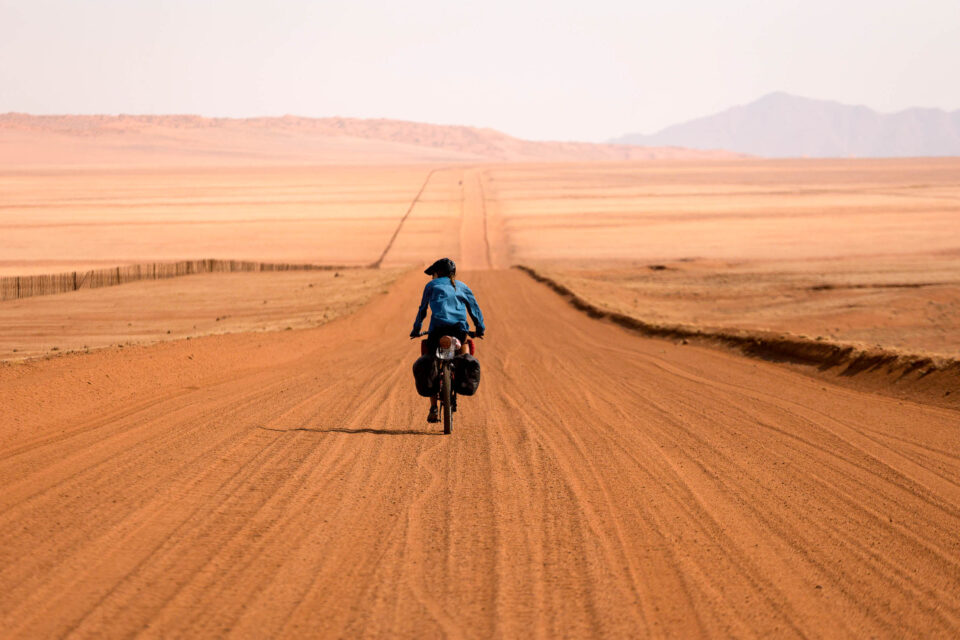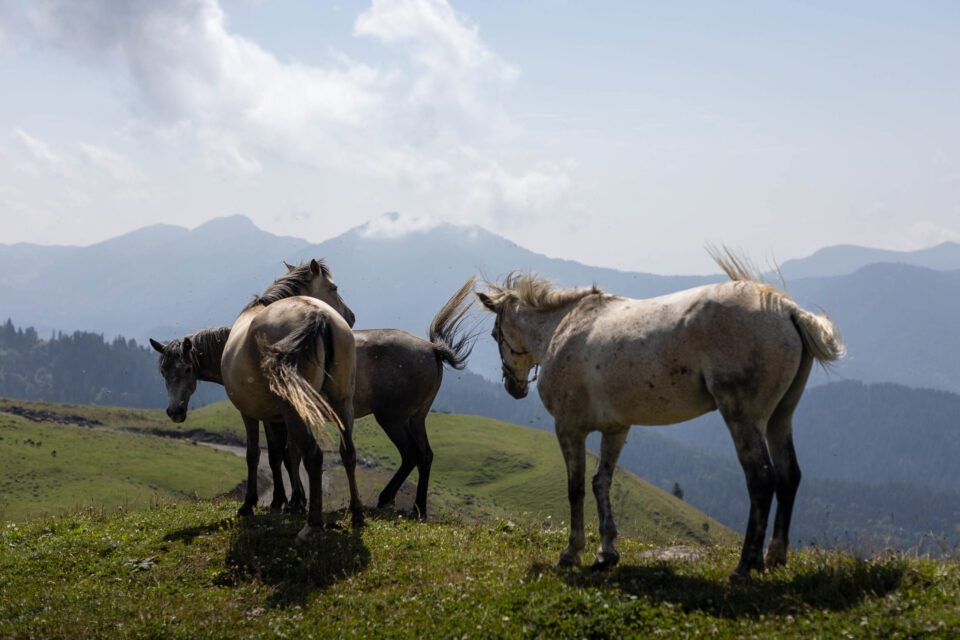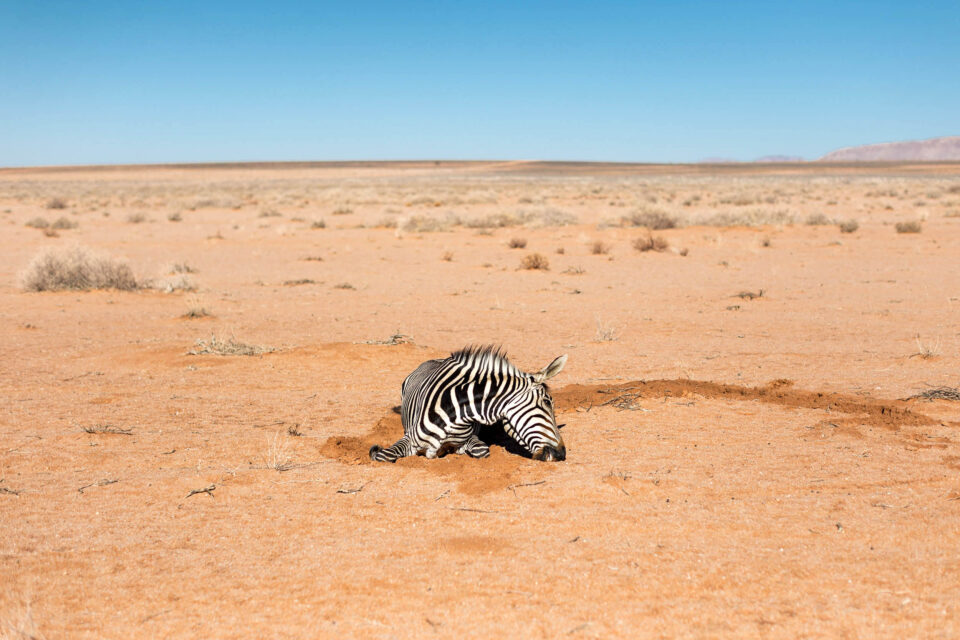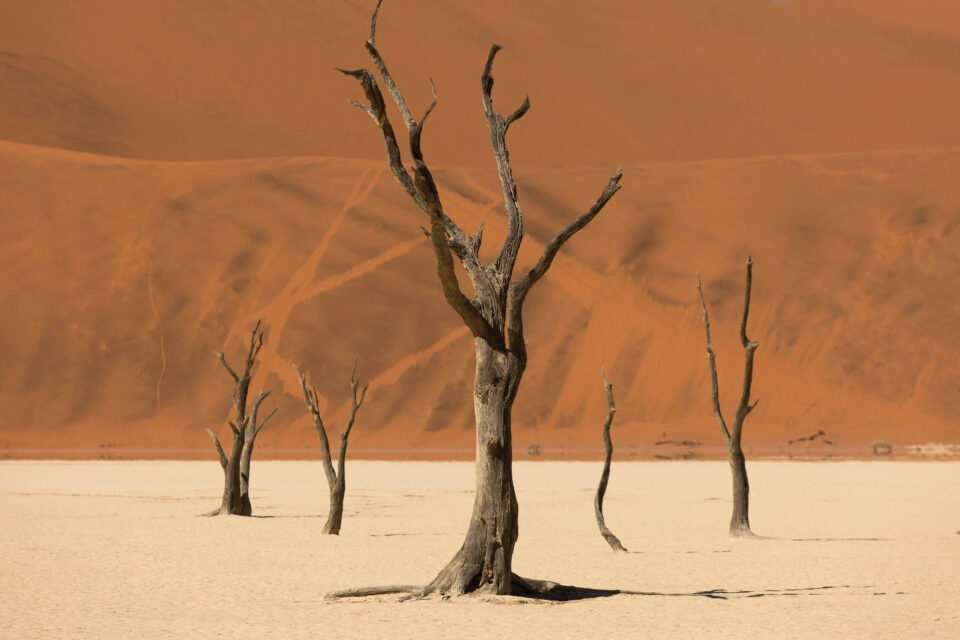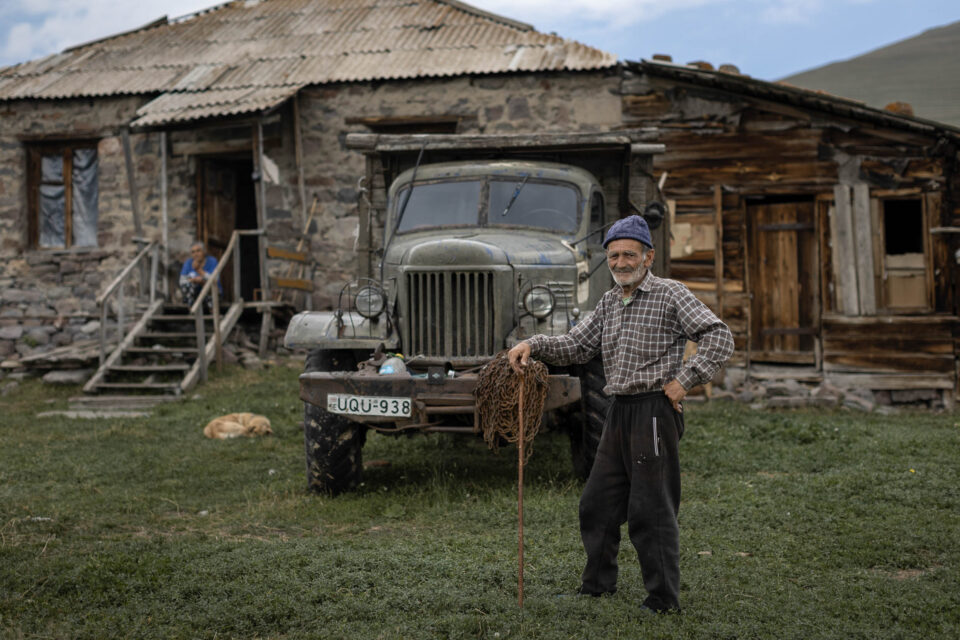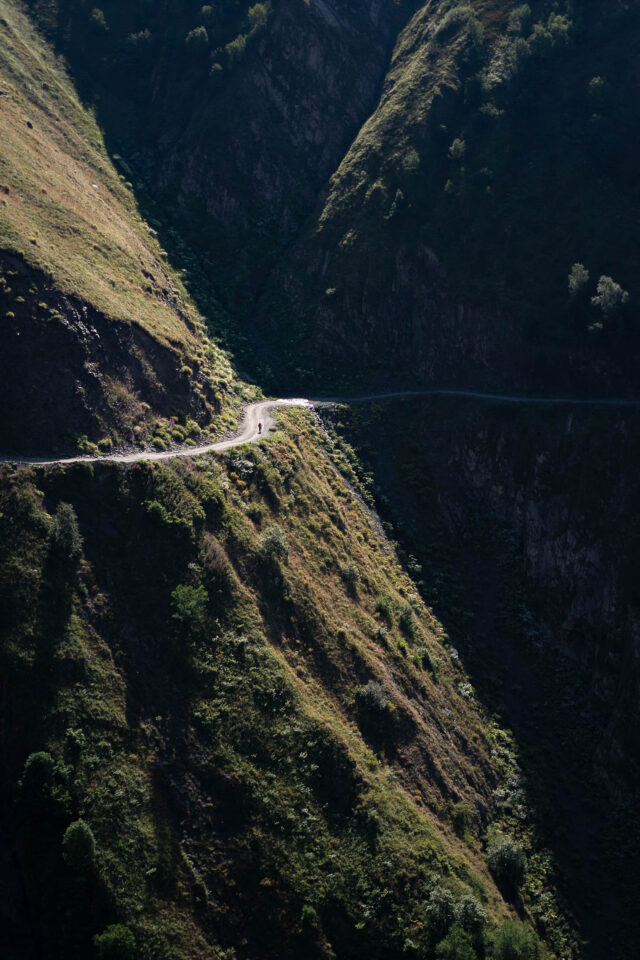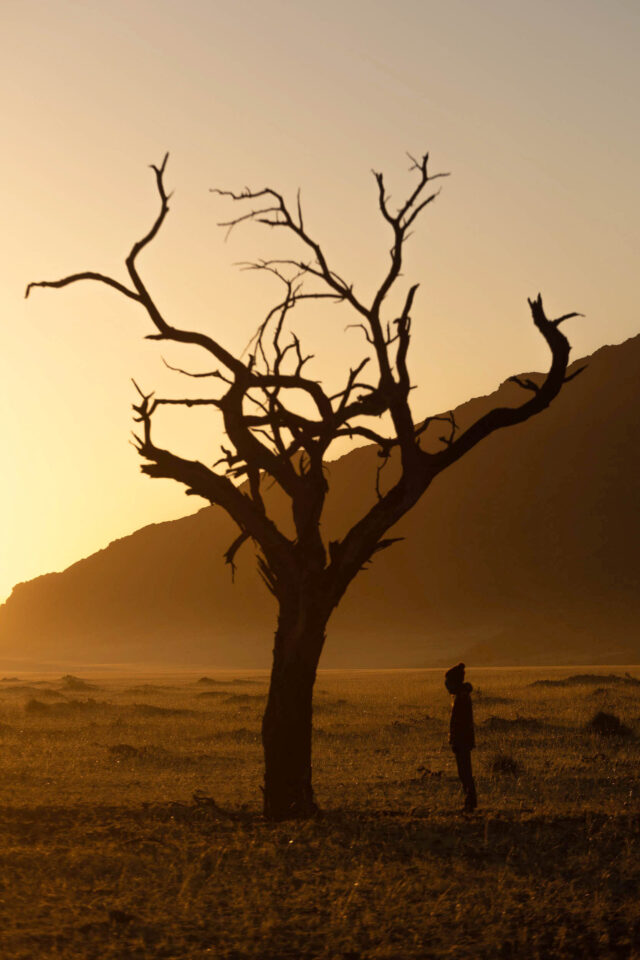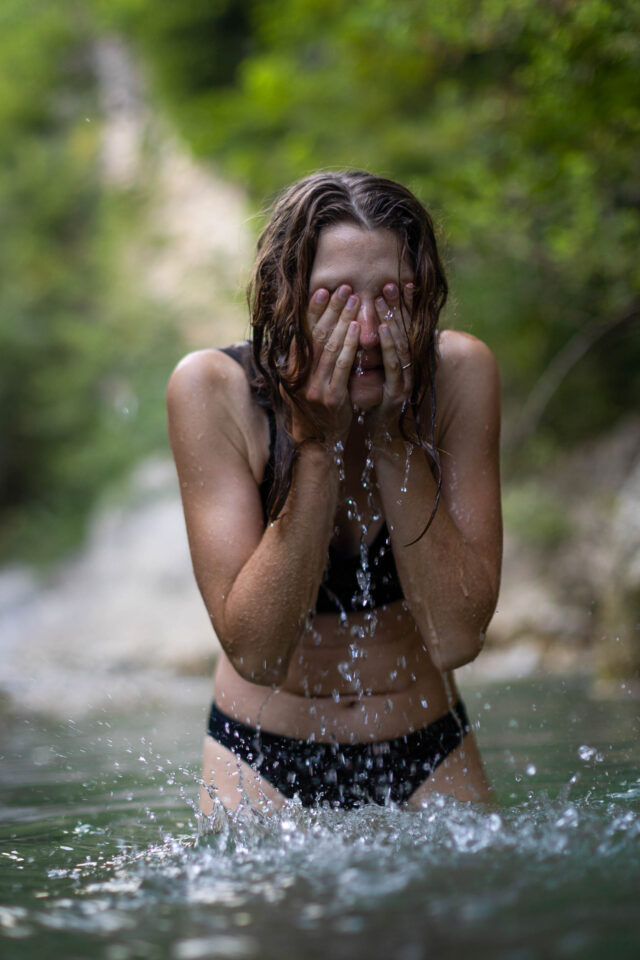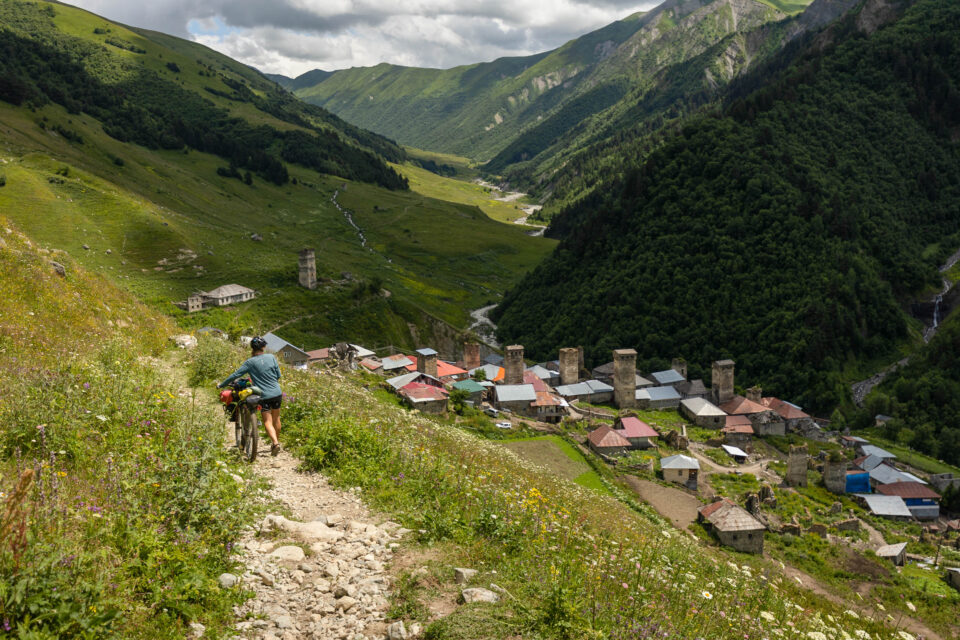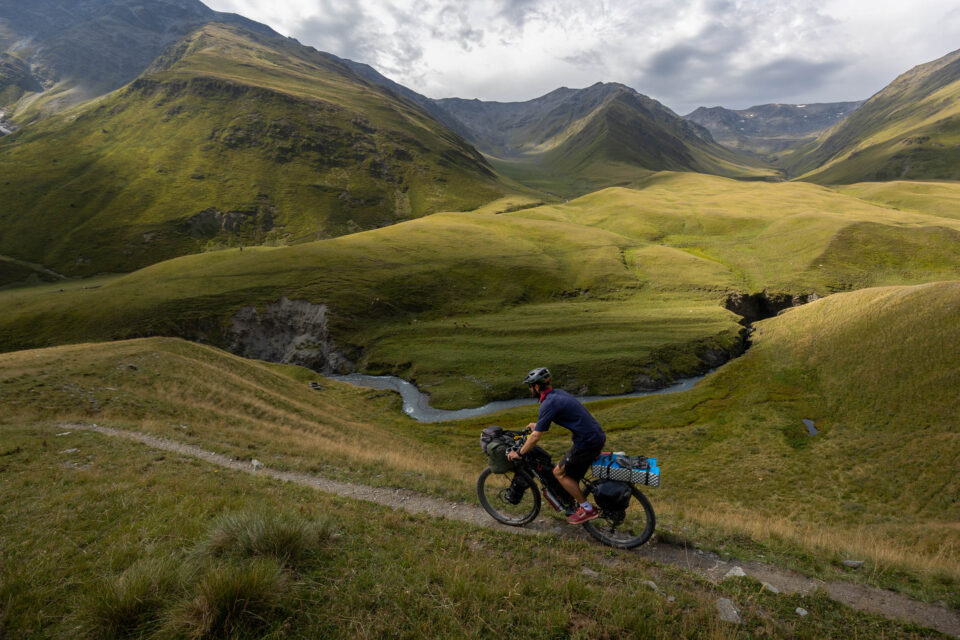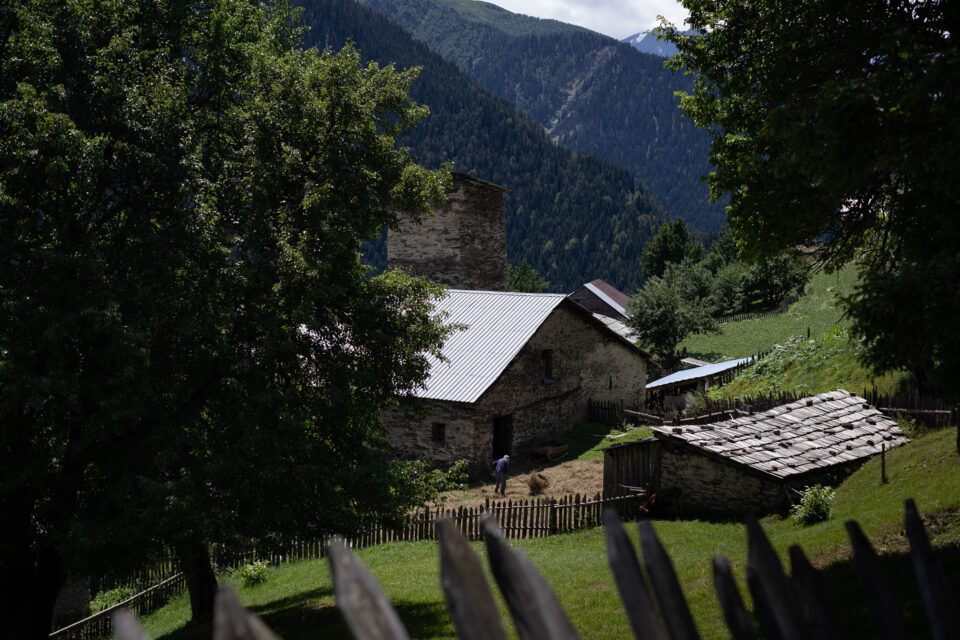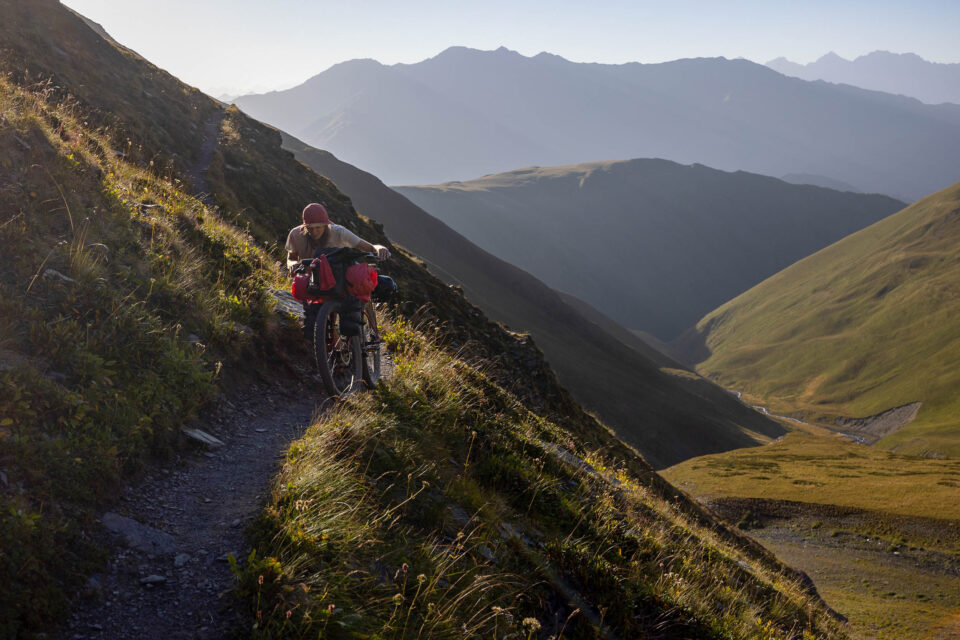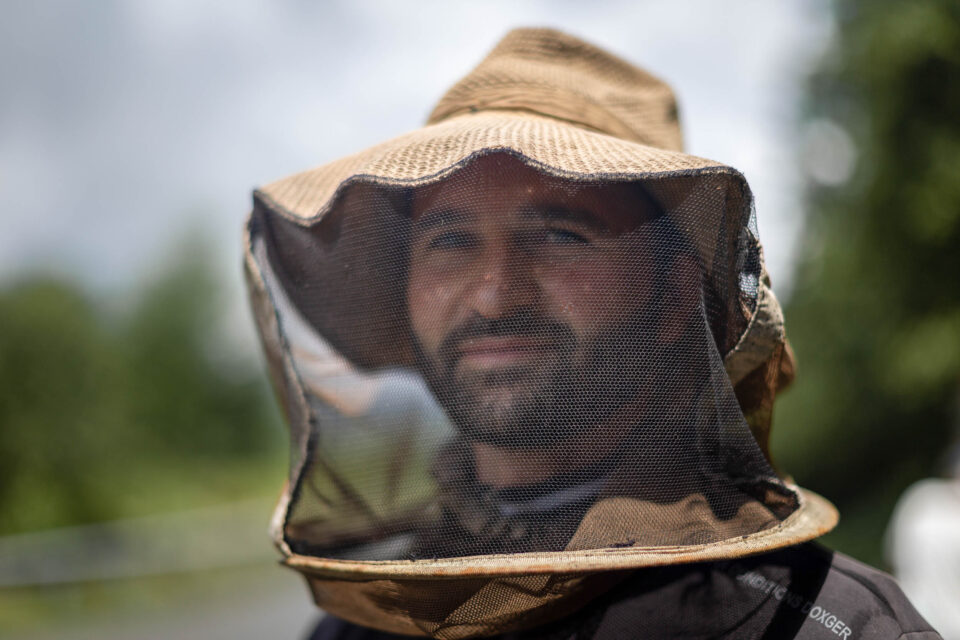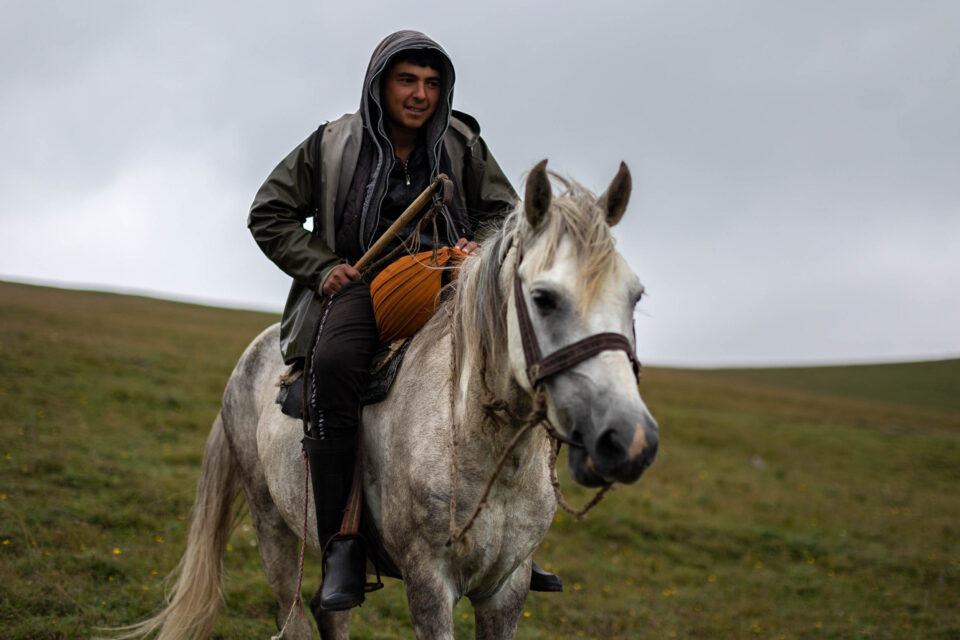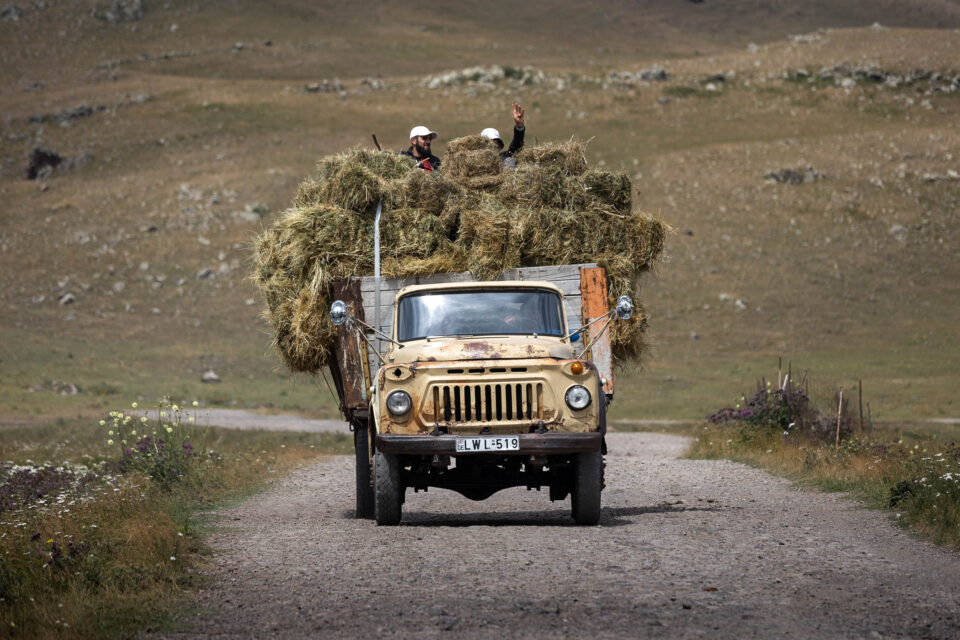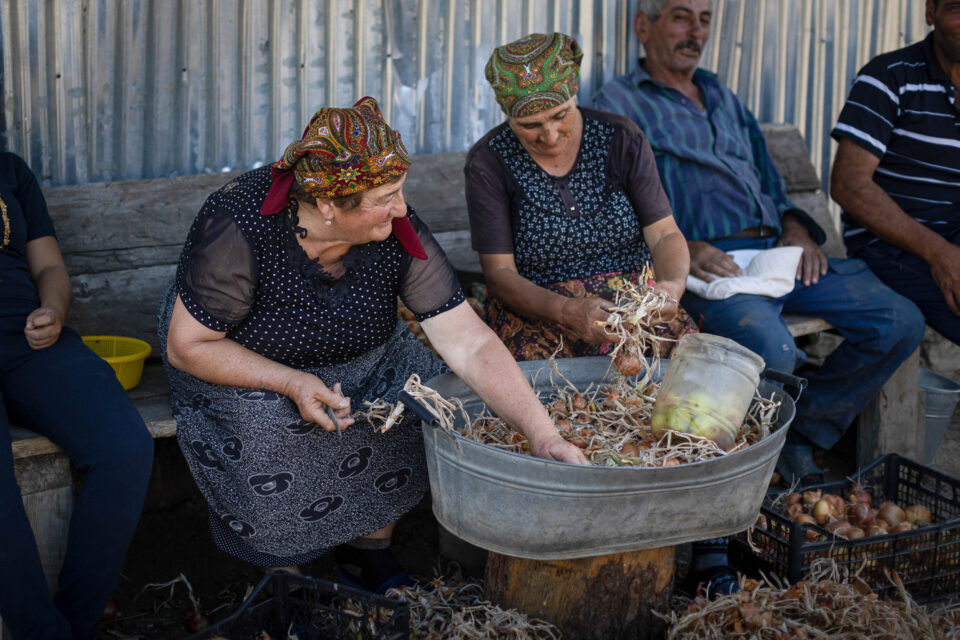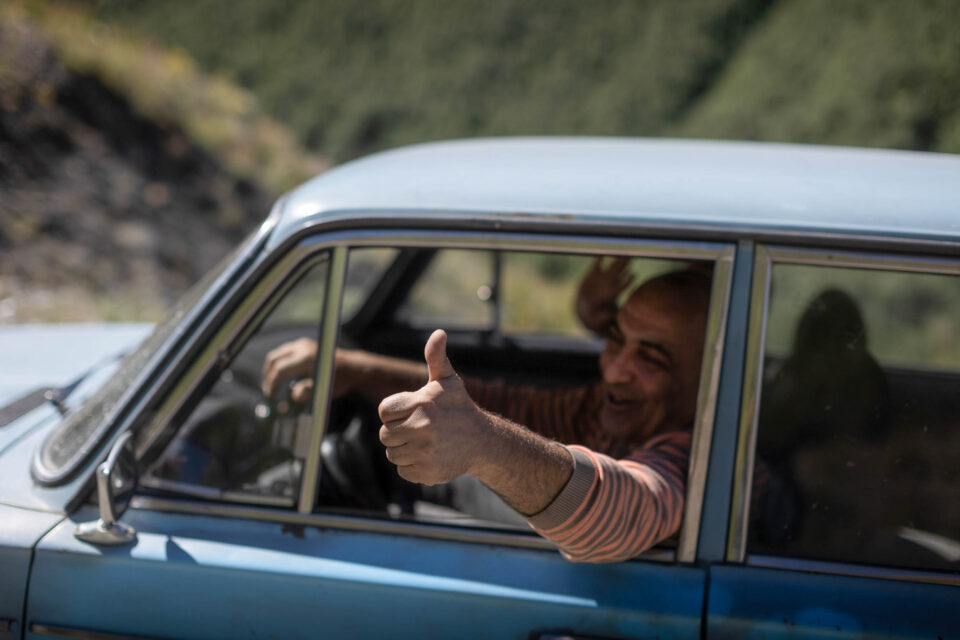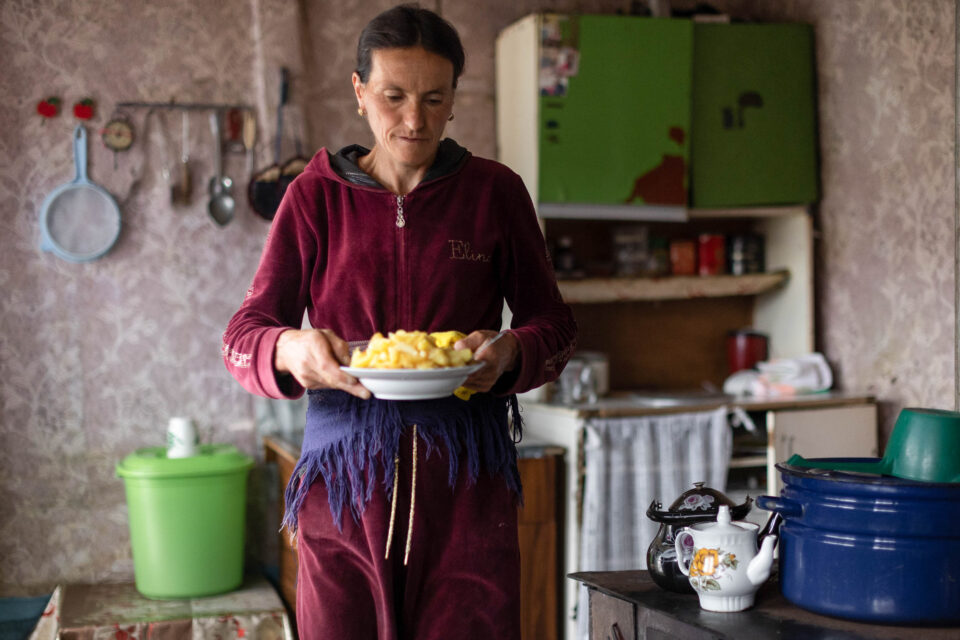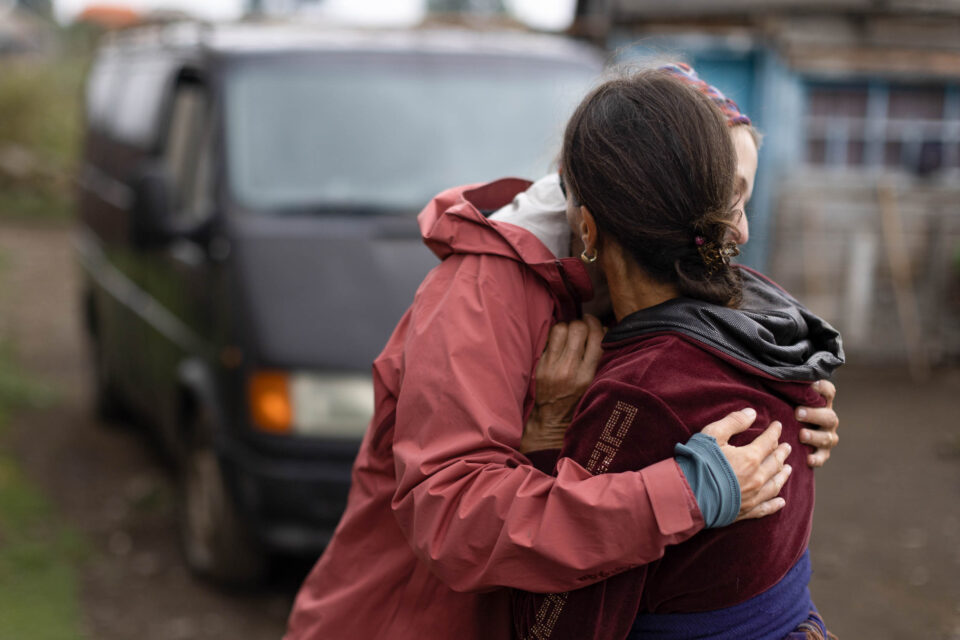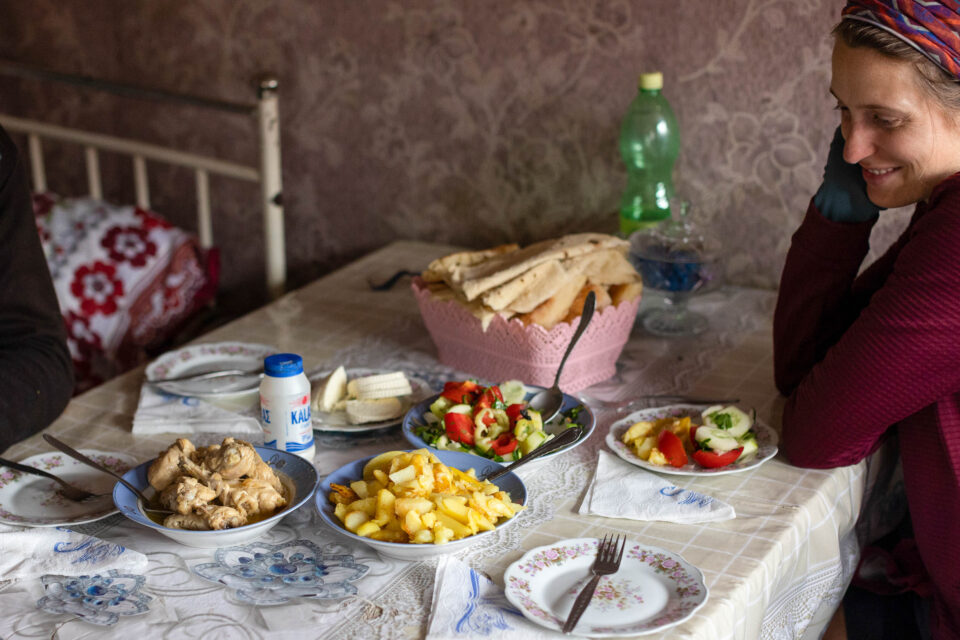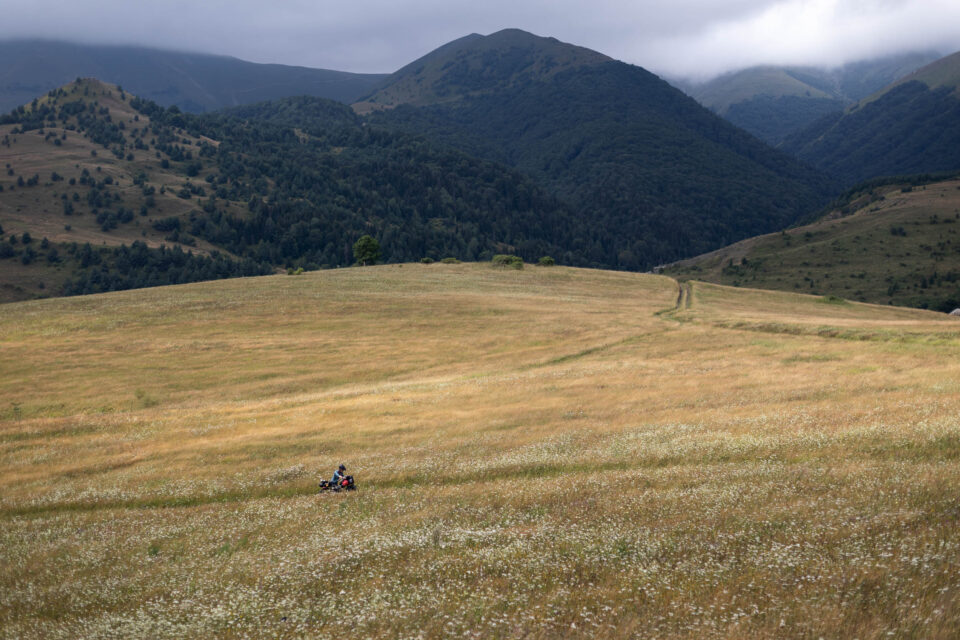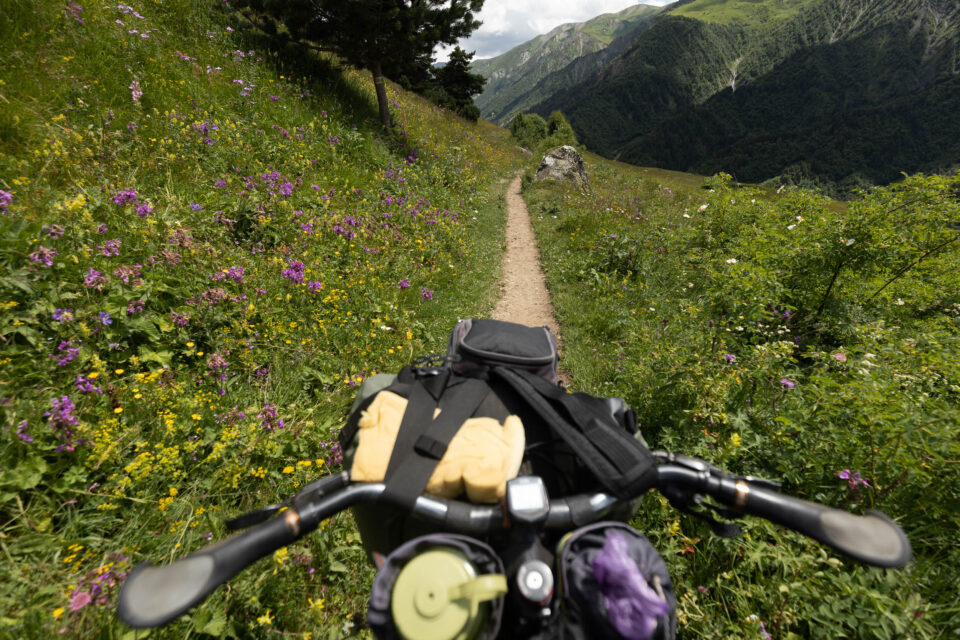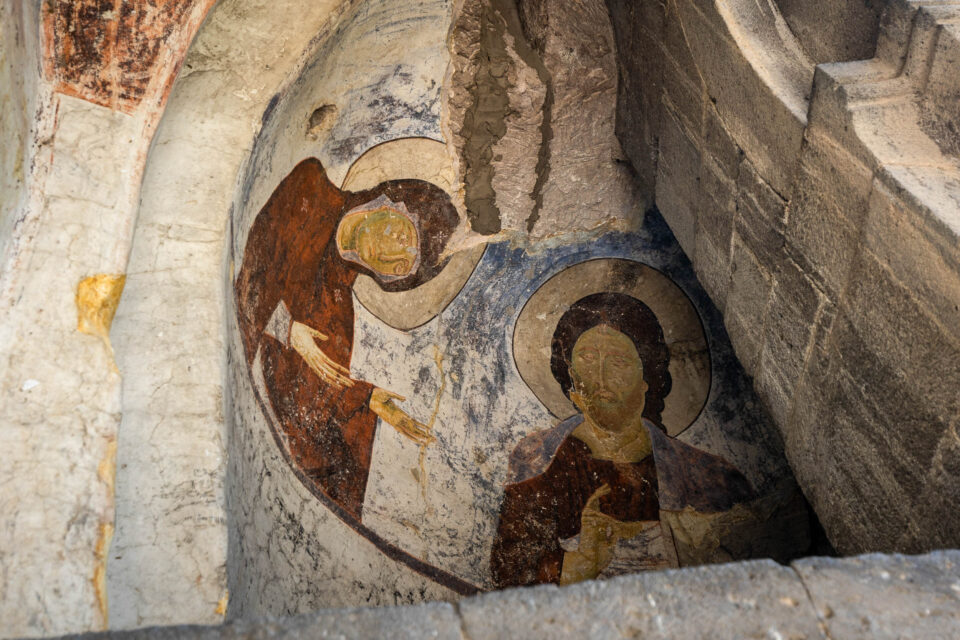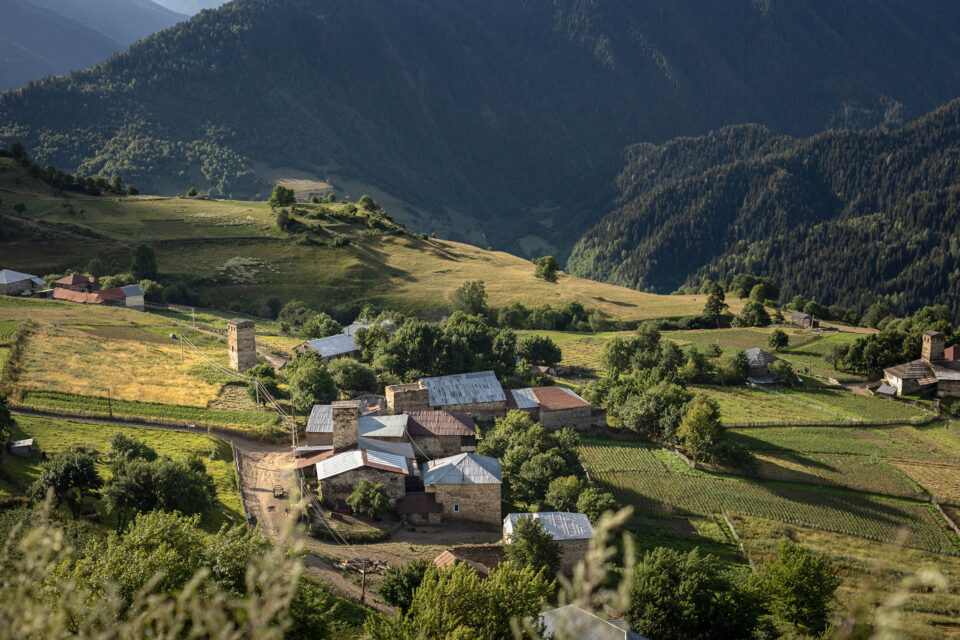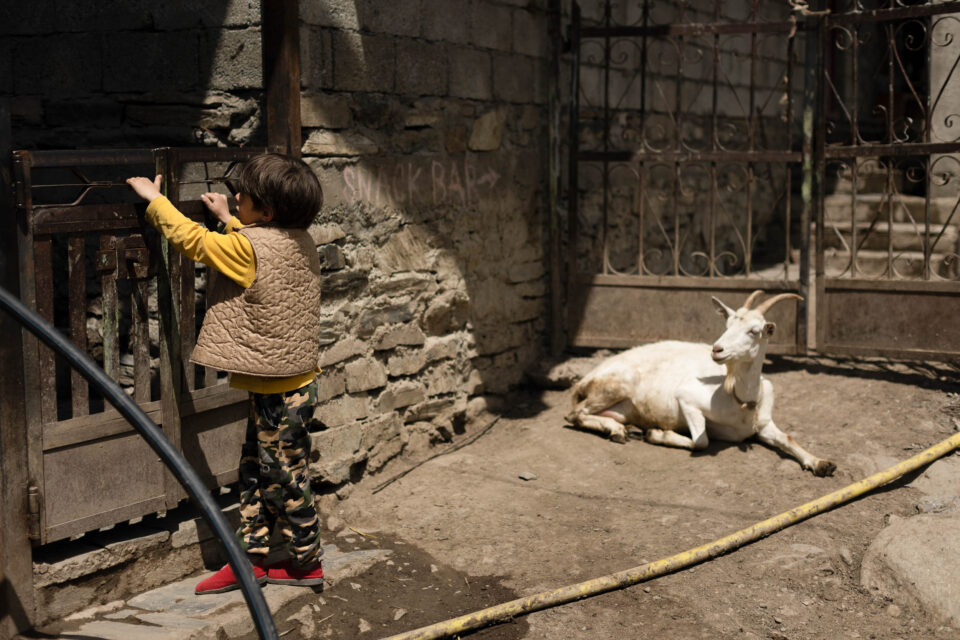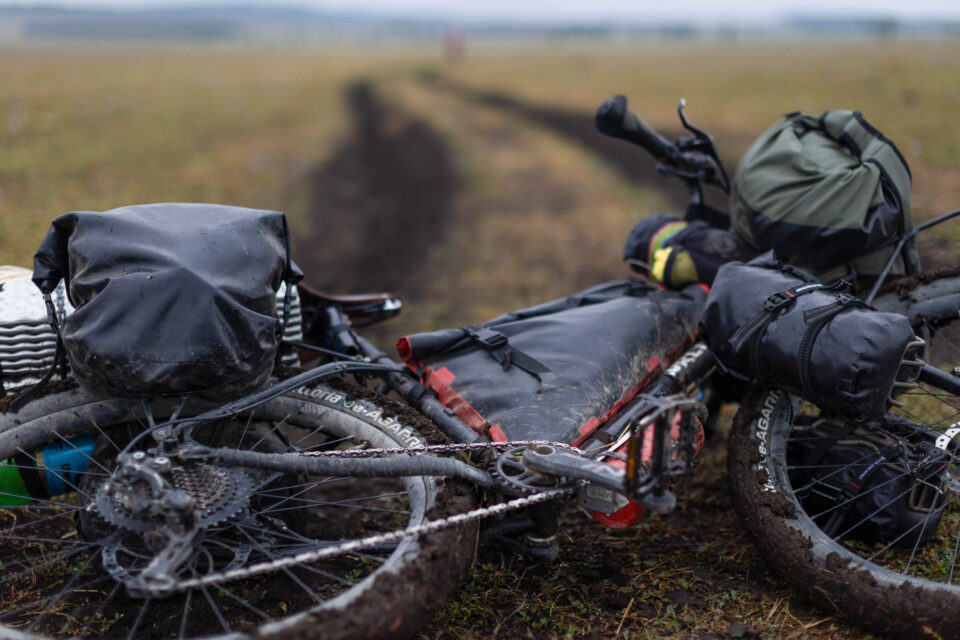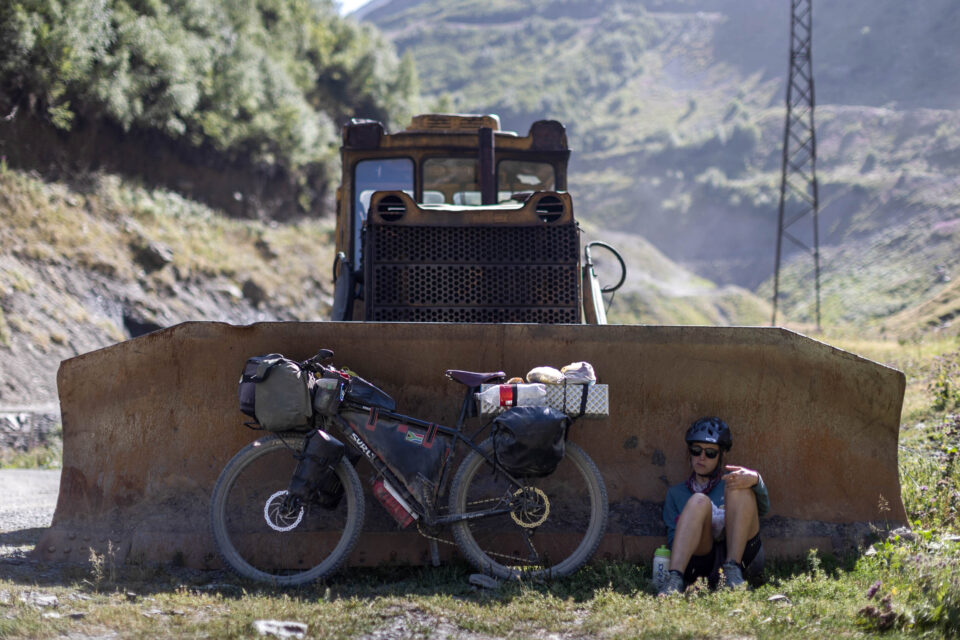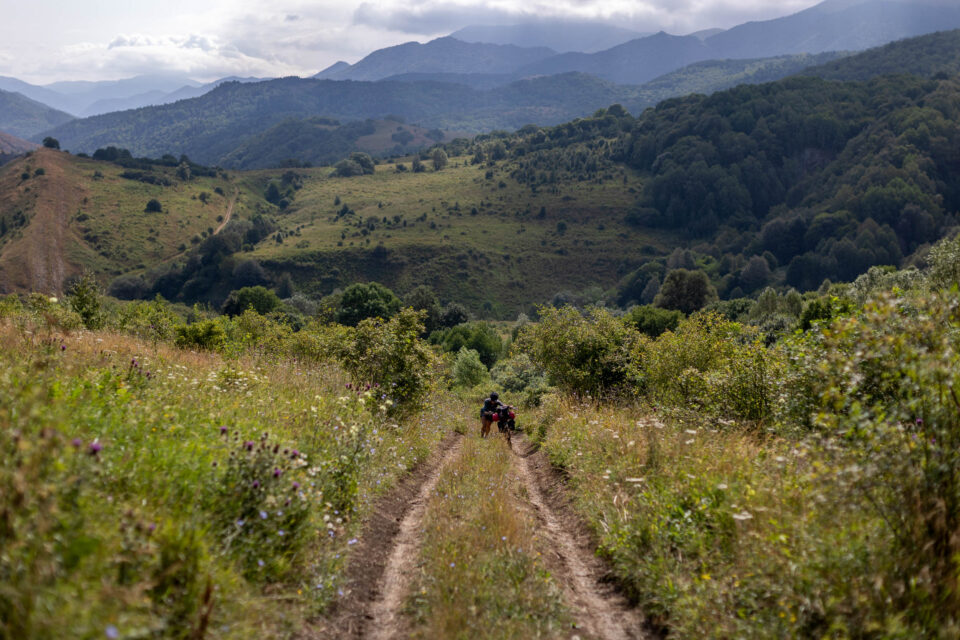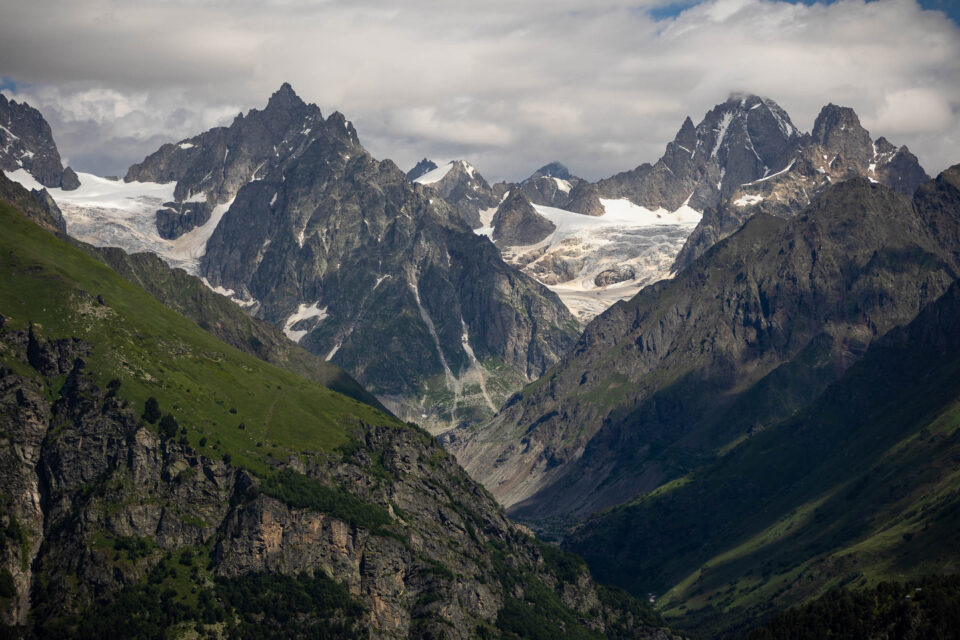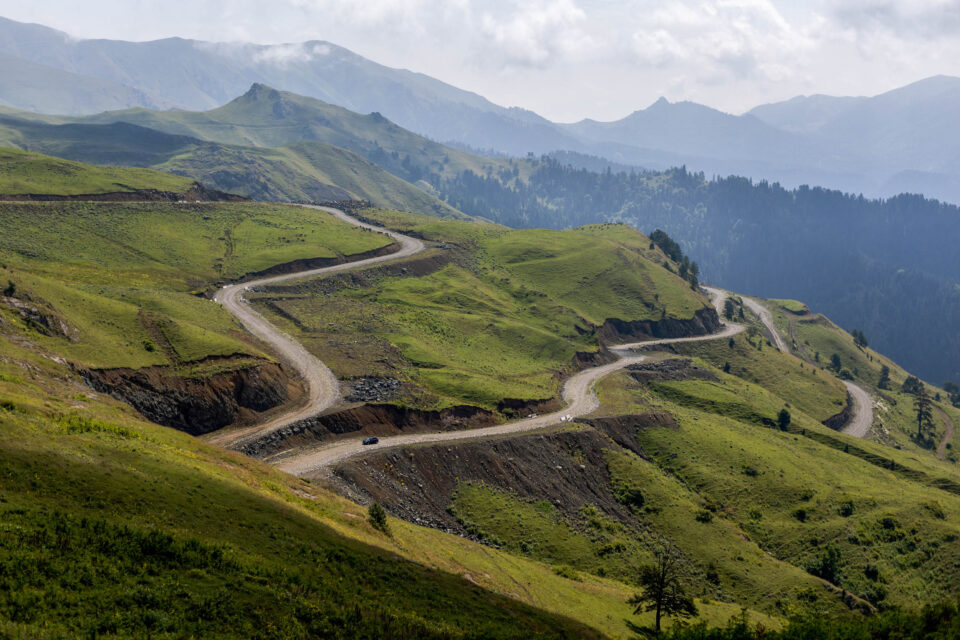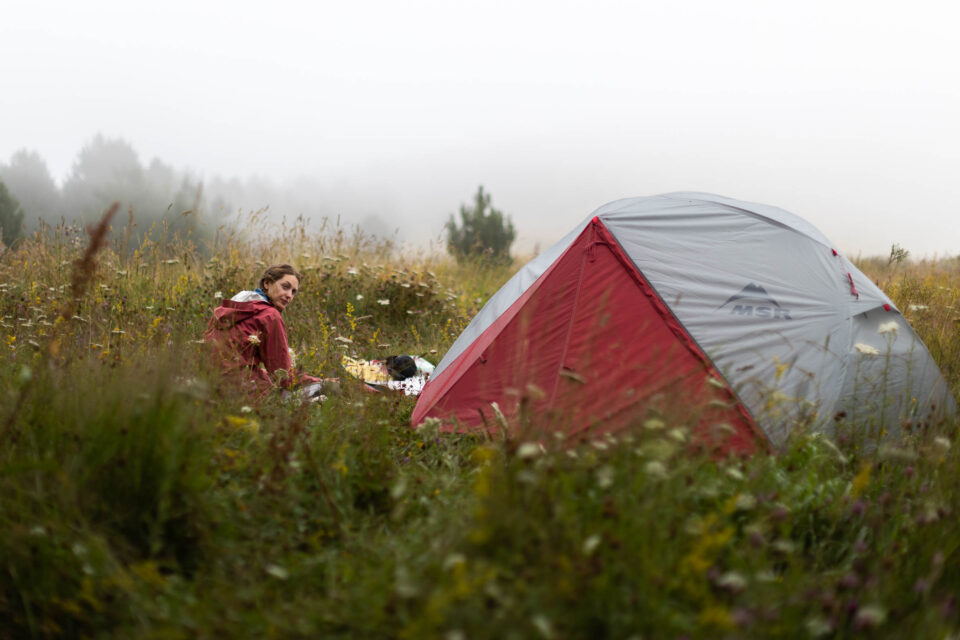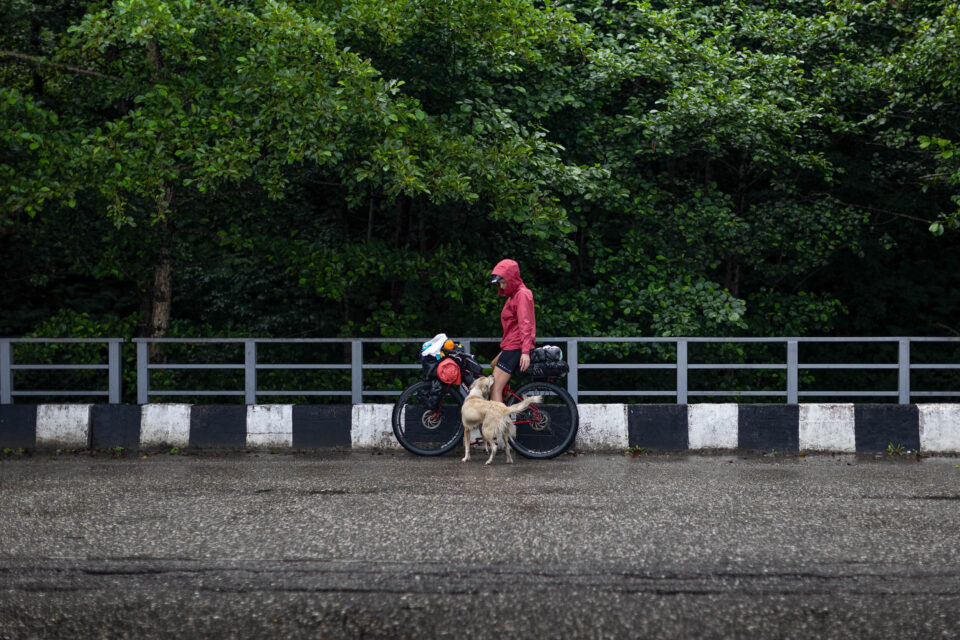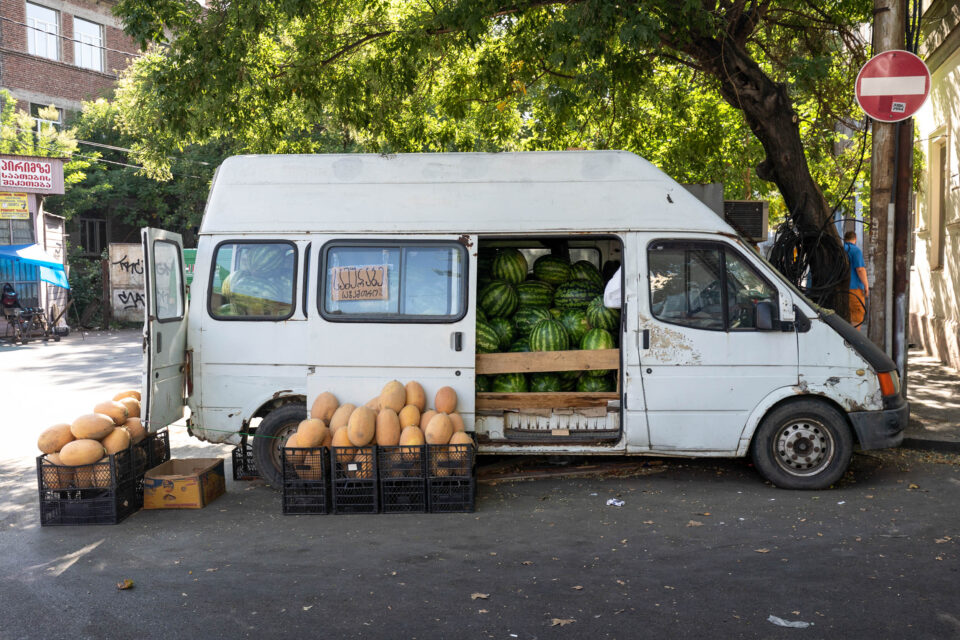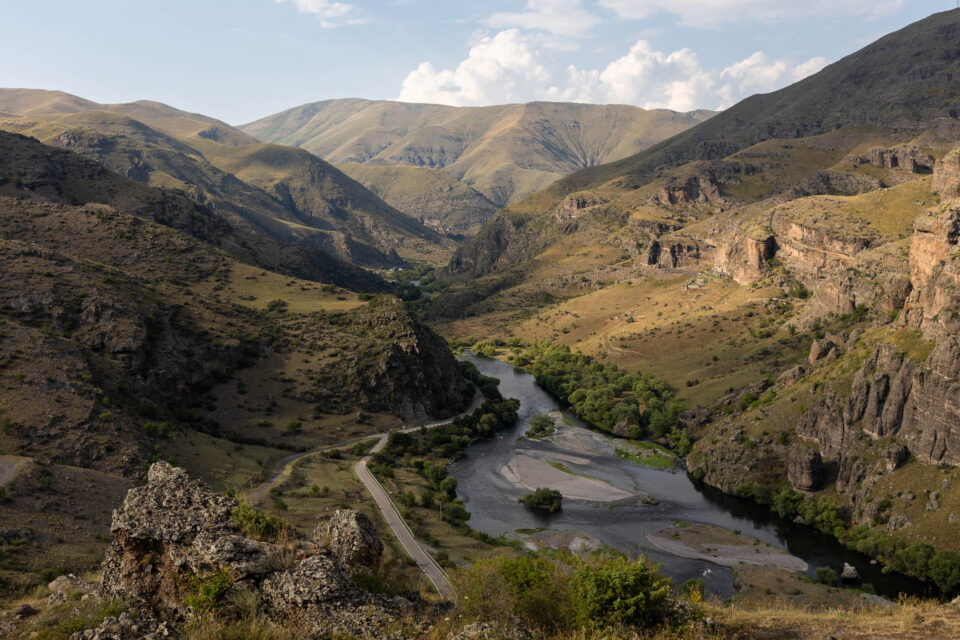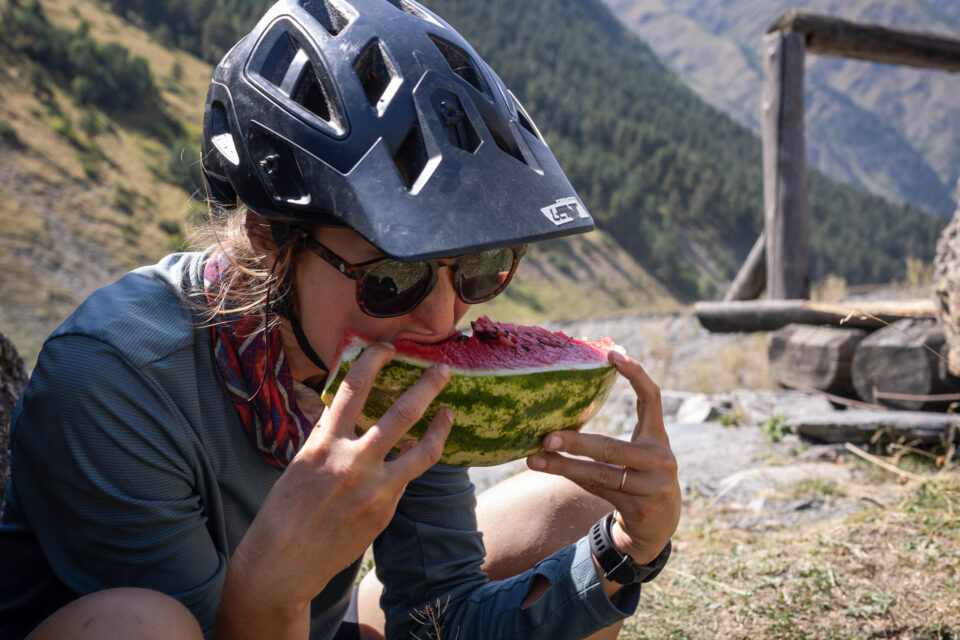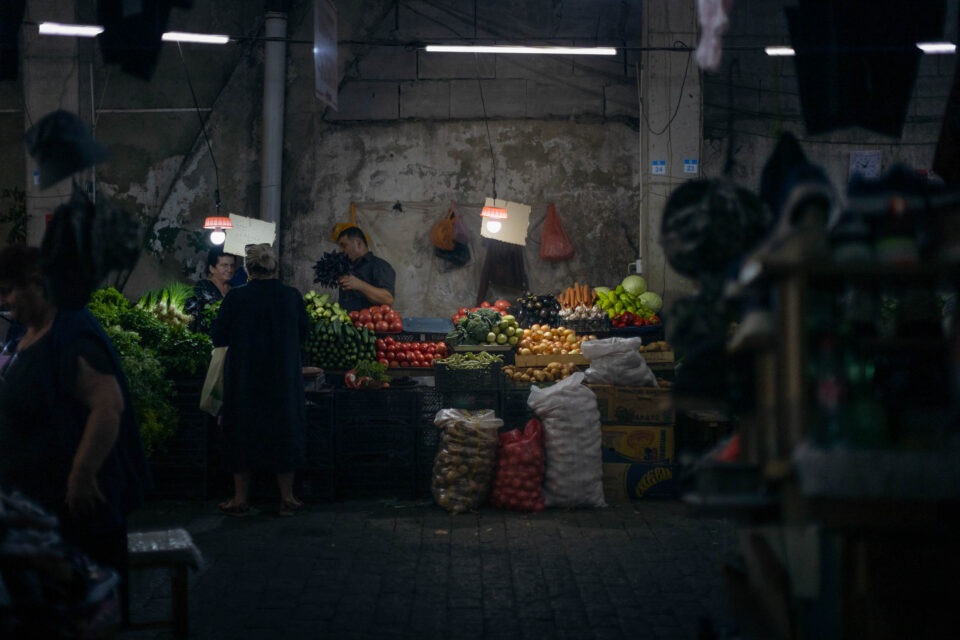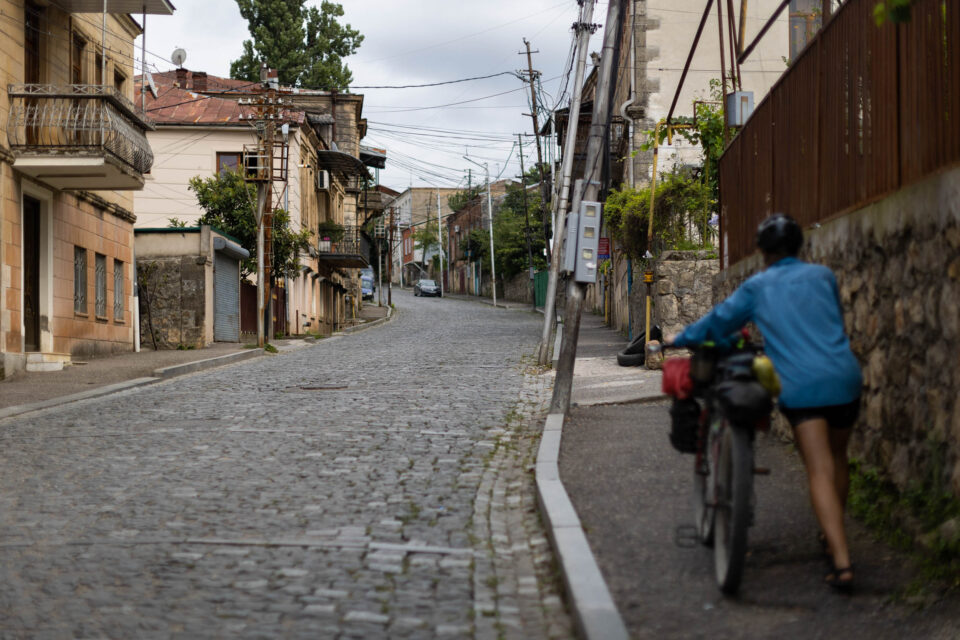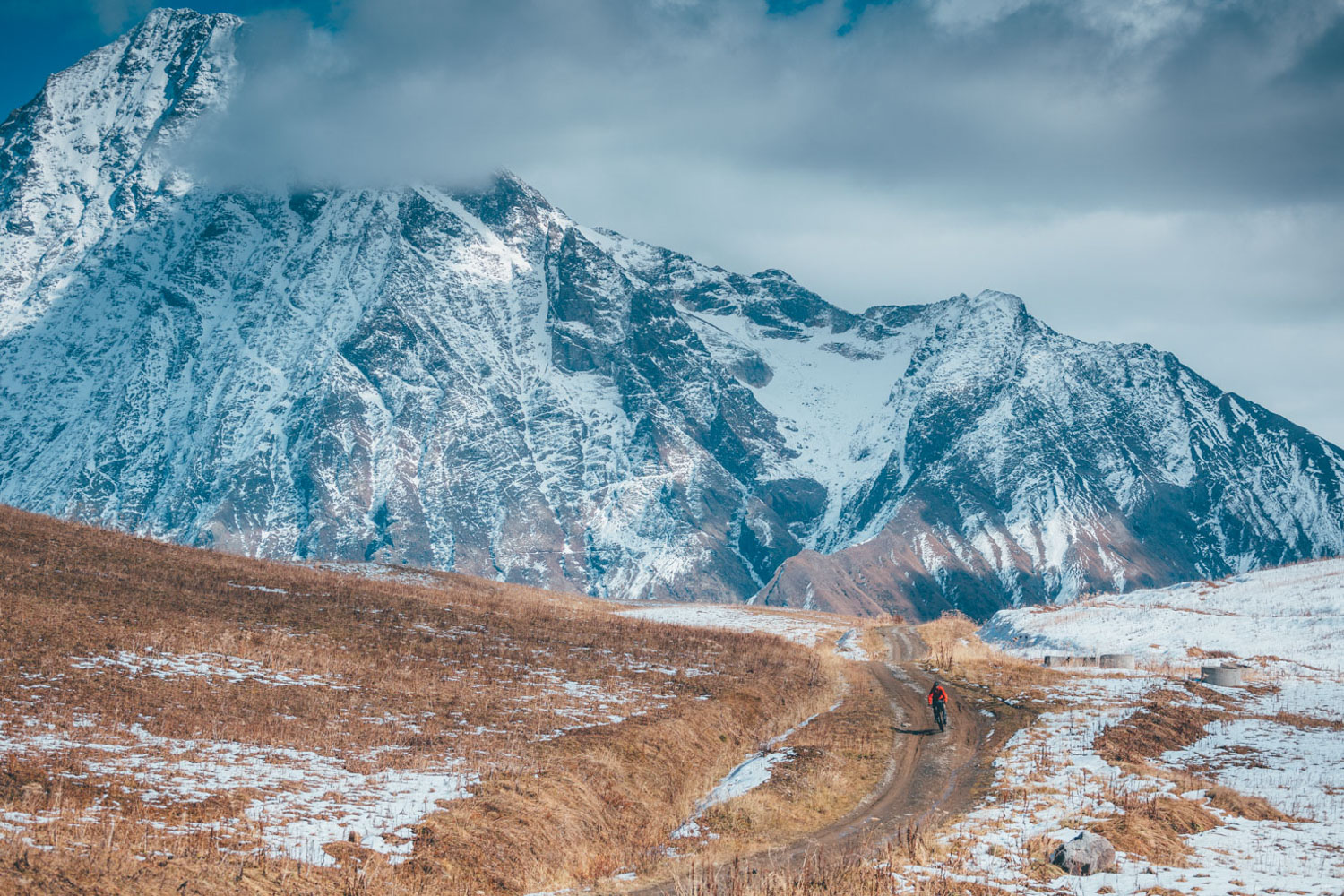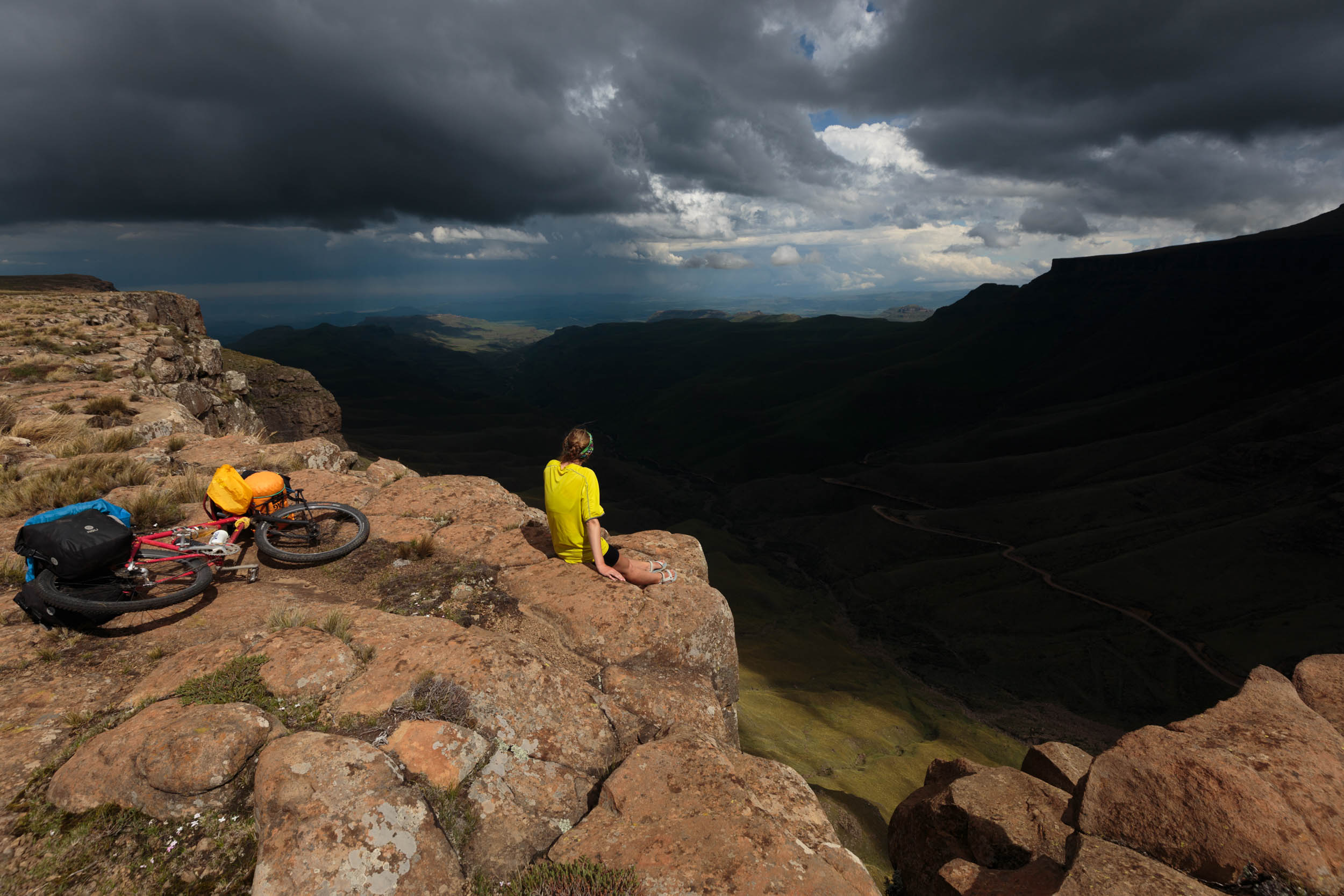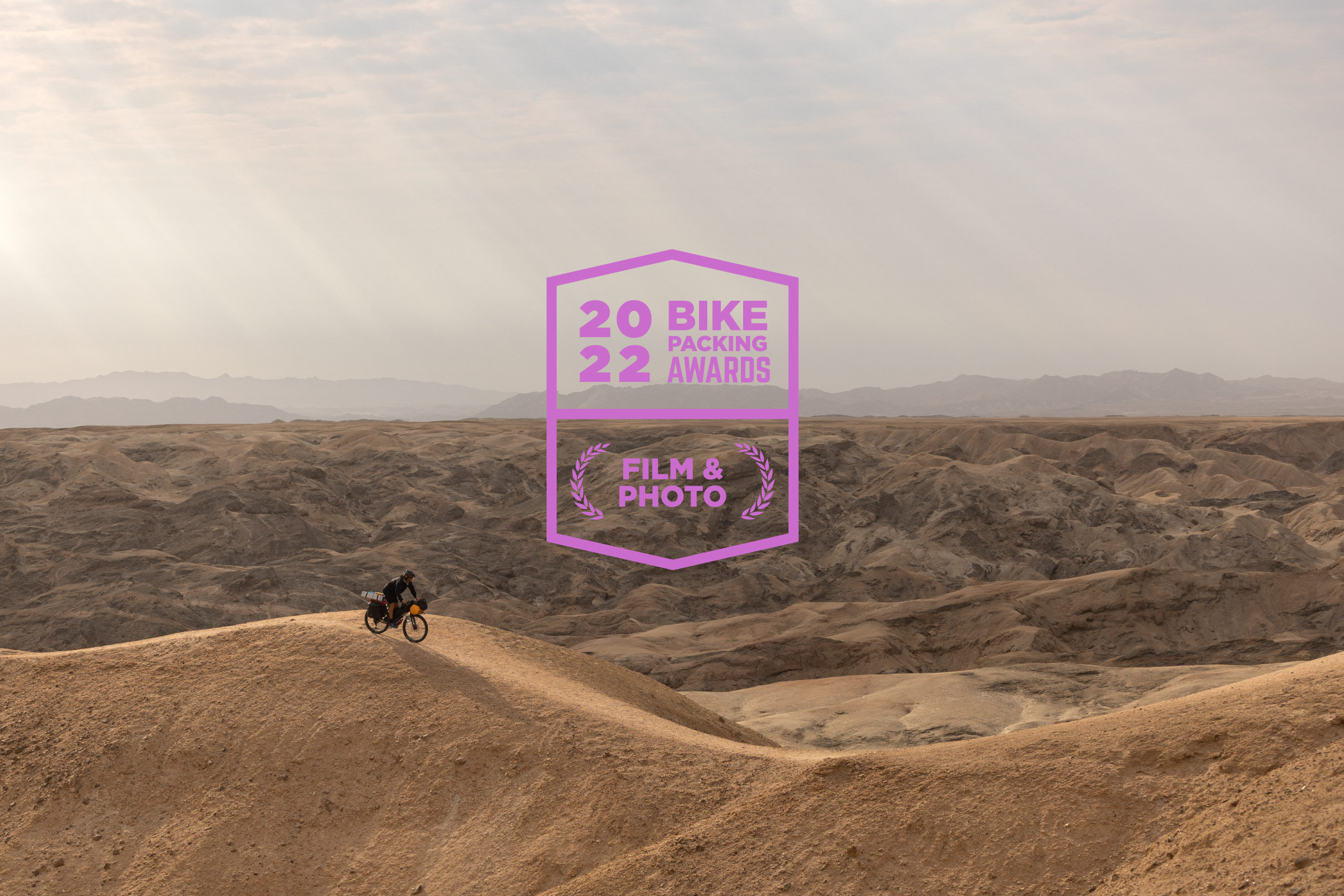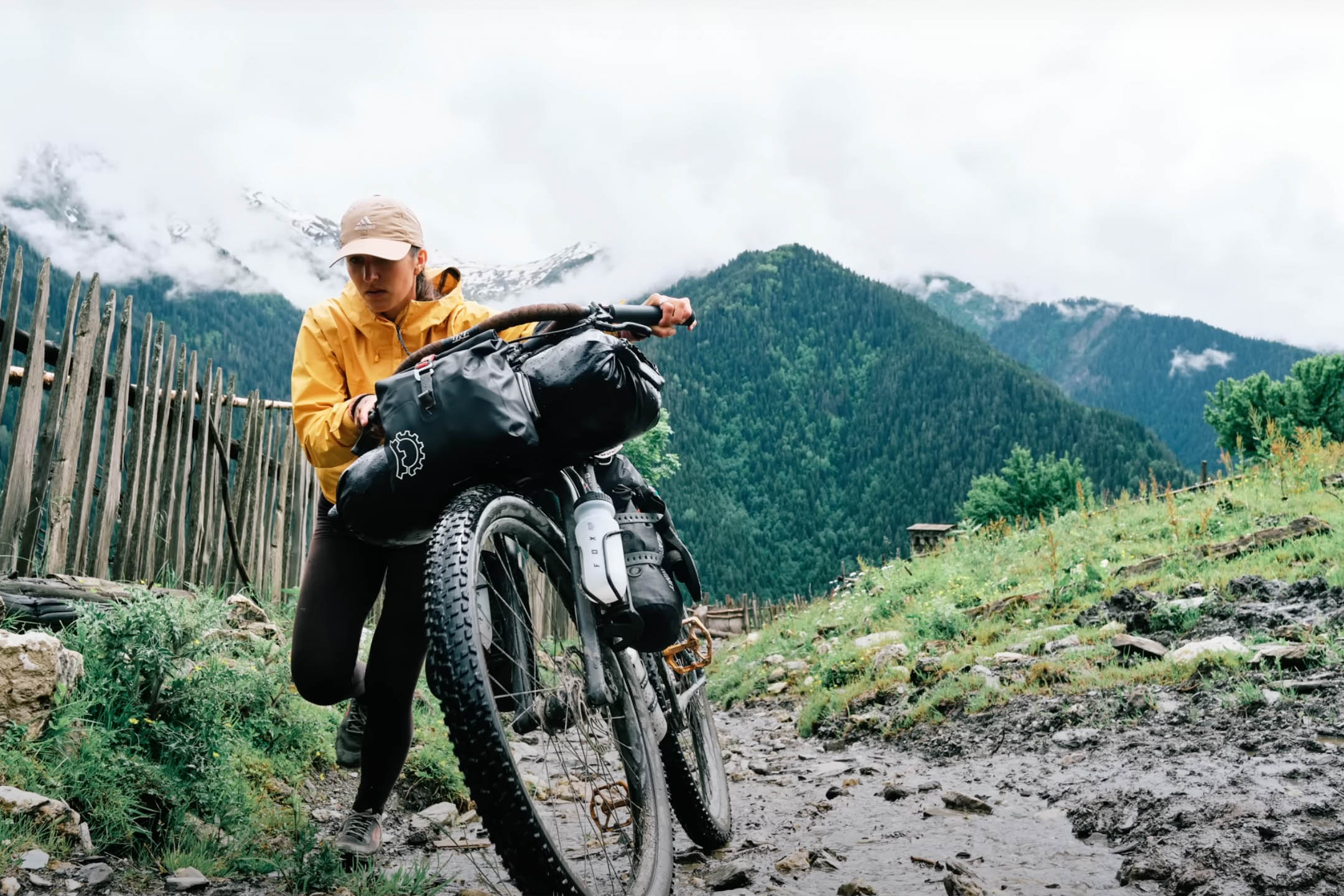Georgia in High Contrast
Share This
Contrasting his experiences of bikepacking back home in South Africa with a recent trip to the Republic of Georgia to ride our Caucasus Crossing route, this piece from Johan Wahl shares how a meaningful chance encounter helped him see the beauty in the unfamiliar. Read it here, paired with an enchanting gallery of images from both countries…
Words and photos by Johan Wahl (@a.whale.away)
I’d eaten too much cheese and was paying the price for it: terrible stomach cramps and vomiting. Everything was coming out at once. Being sick at that moment was most untimely. It was still early in the day, and we had a long and hard hike-a-bike ahead of us. The next real town–a place to properly rest and resupply–was at least another day away. Besides, our surroundings were nice, and I would have loved to take it all in properly. Had I not been down on my haunches, dreadfully anticipating the next bout of vomiting, I’d probably have been darting back and forth merrily trying to capture it all with my camera.
We were perched on a proud little hill. Below us, set in a thin layer of mist, was a quaint little farmers’ village. The village was unpretentious and typical of the deep rural Georgian countryside: homes of mixed stone and timber construction, large hayricks, and smoke rising from the odd chimney. The distant sound of goat bells was dominated by a peaceful silence that seemed to drown out all but my retching.
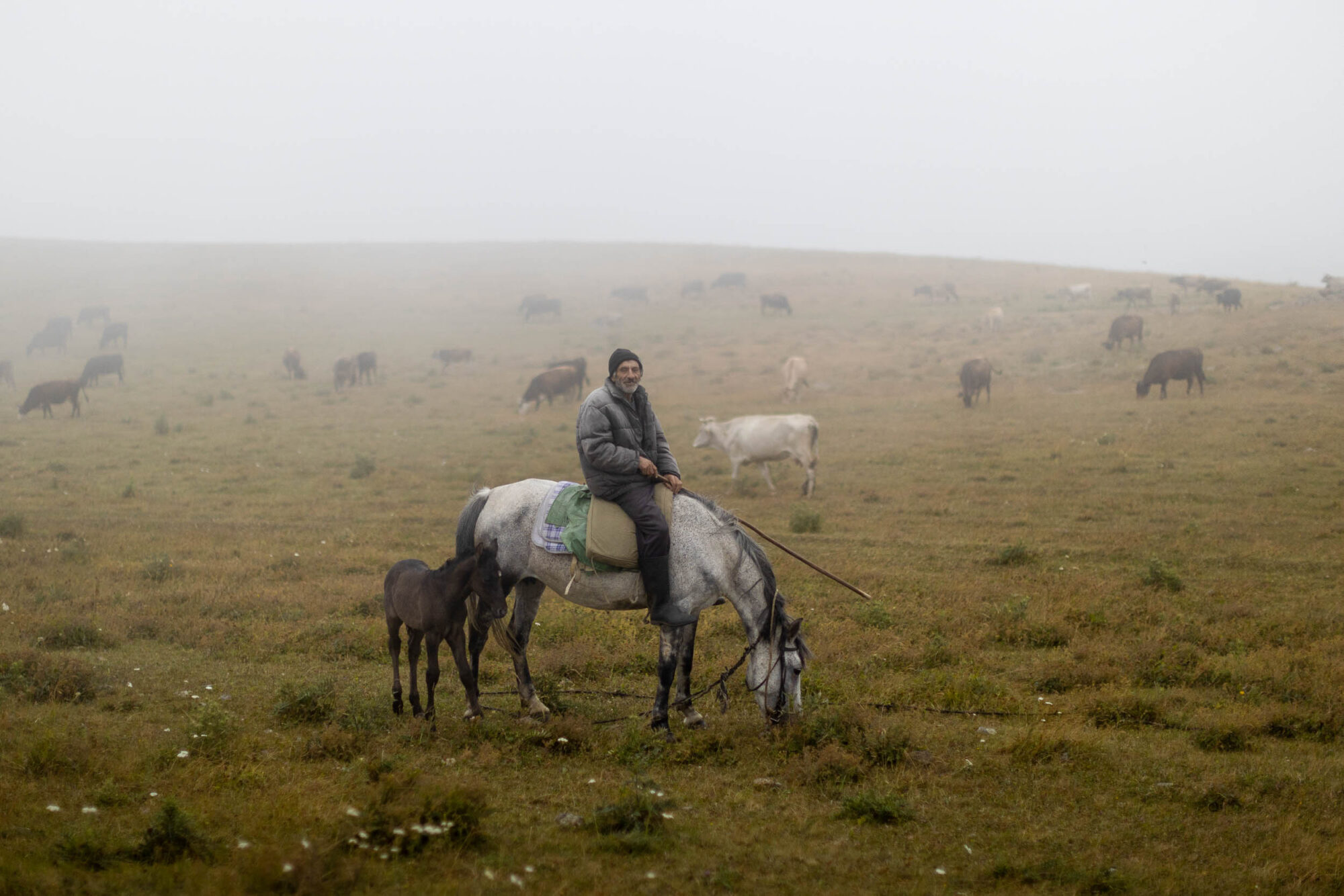
I vomited again and felt a helpless surge of self pity. Silence returned, causing me to reflect. My nausea wasn’t the only thing causing me distress. The mountains seized my attention. Their muddy slopes tauntingly loomed down on me, and I felt acutely aware of how miserably far from home we were. I didn’t have to see Jana’s face to know that she wasn’t in a good space either, but when I turned to catch her gaze, her dark expression confirmed it. She had had enough. I let my head sink back down again.
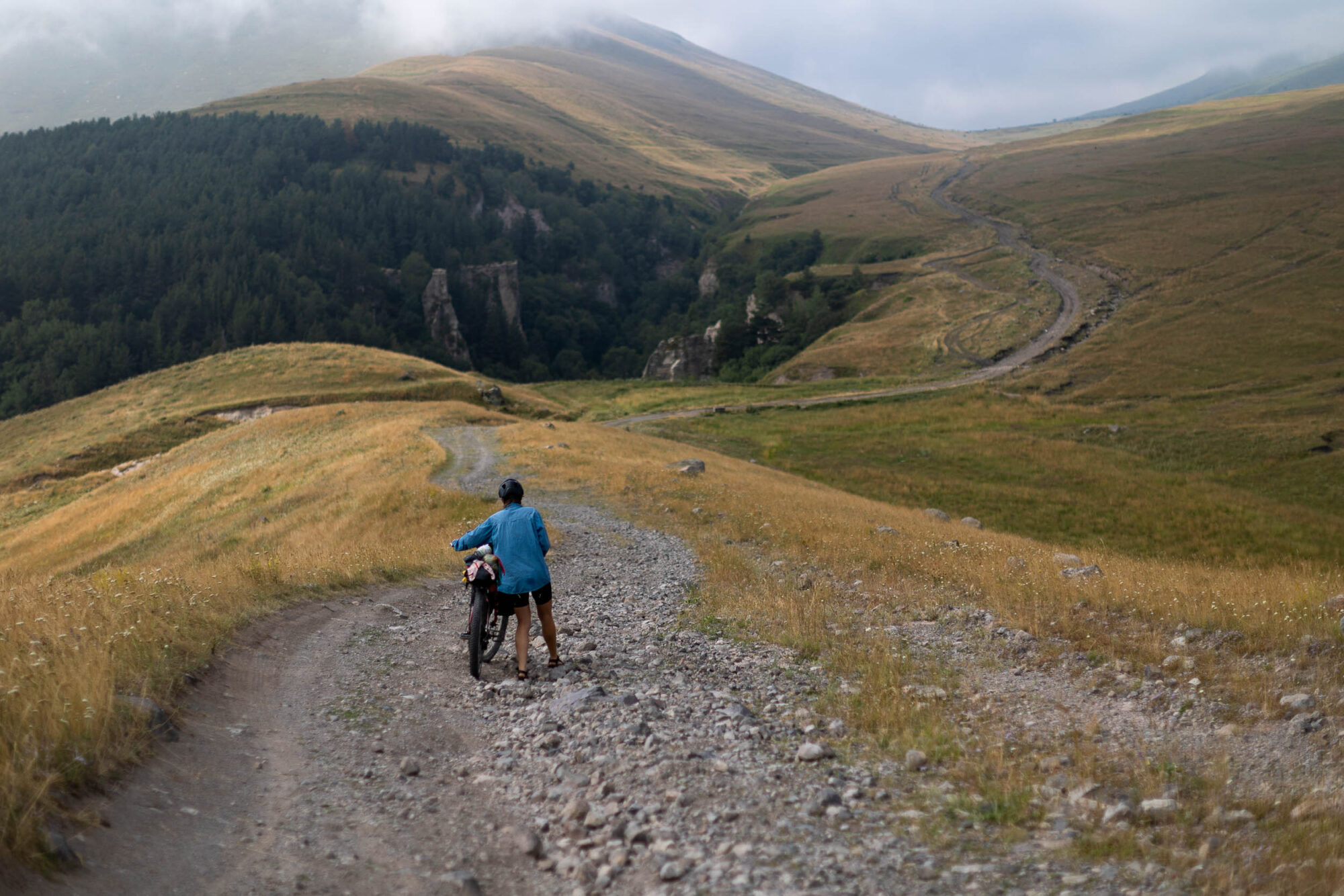
We were a few weeks into BIKEPACKING.COM’s Caucasus Crossing (Georgia) route and indeed, we were very far from home. Our home is South Africa, and on other recent adventures, we didn’t venture too far off. Our previous bikepacking trip was a long ride through the deserts of our country’s north and Namibia’s west. In those parts, life on the bicycles followed a very distinct course that we became accustomed to.
Desert Days
A typical day in the desert went something like this: We awake at first light and eagerly get up to inspect our camp for footprints. Did anything creep about our tent again last night? We wishfully expect to find the prints of something big–perhaps elephants or a leopard but find nothing but jackal tracks. Not the most exciting find, but it will make for exciting conversation the rest of the day. We’ll no doubt be without any company but our own.
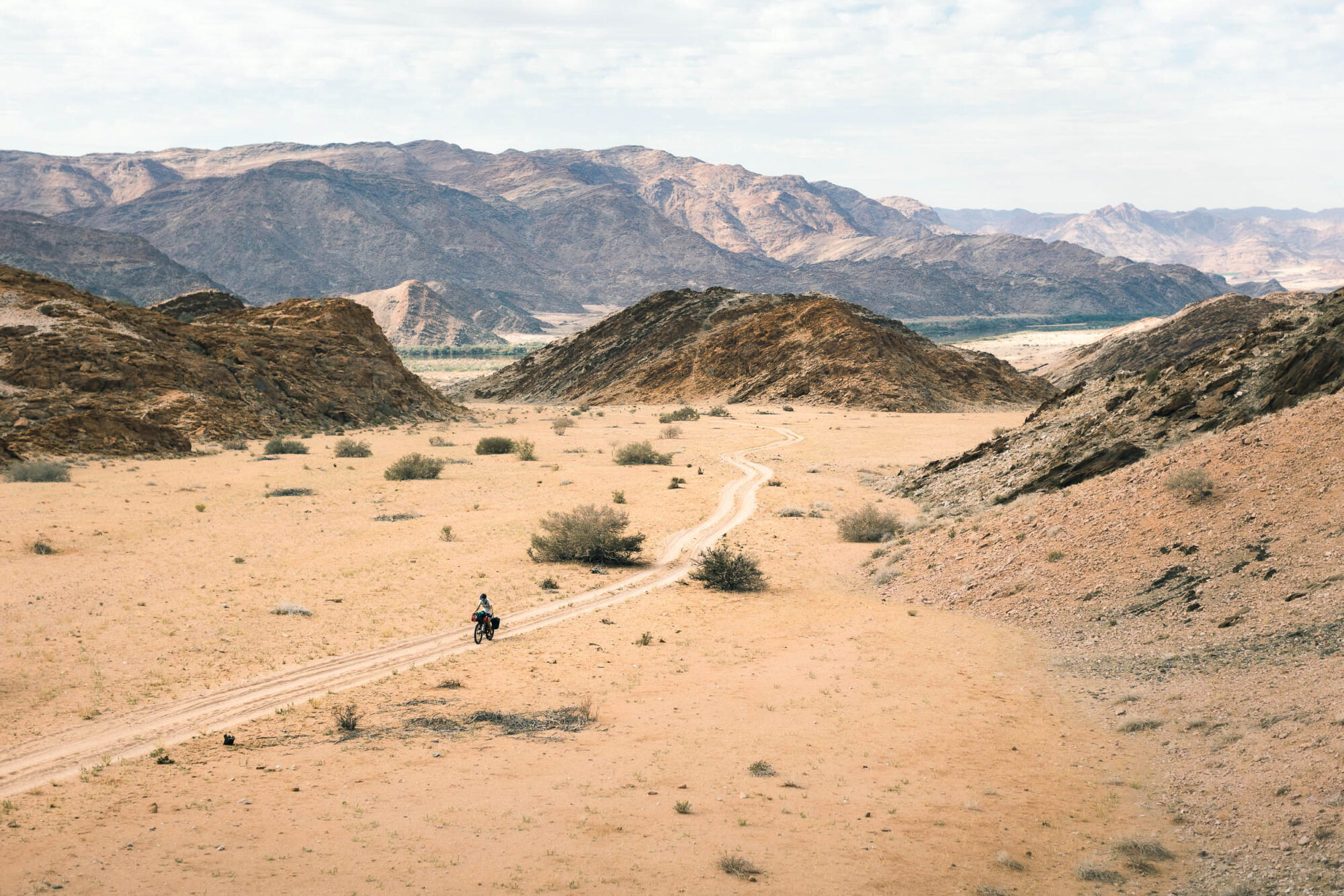
We cook oats for breakfast. It’s our staple breakfast and pretty much the only thing we ever find in the little convenience stores we pass from time to time. After breakfast, we begin to break up our camp. The air is bone dry, and the static cracks between the layers of our tent as we go about folding it.
We hit the road, making some progress, but it seems arbitrary. We won’t reach the next town tonight, no matter how hard we push. We’ve used up nearly half of our water supplies, but we’re not too concerned yet because there’s still almost 10 litres left on the bikes. An extra litre or two may have meant we could wash ourselves tonight, but that’s not going to happen.
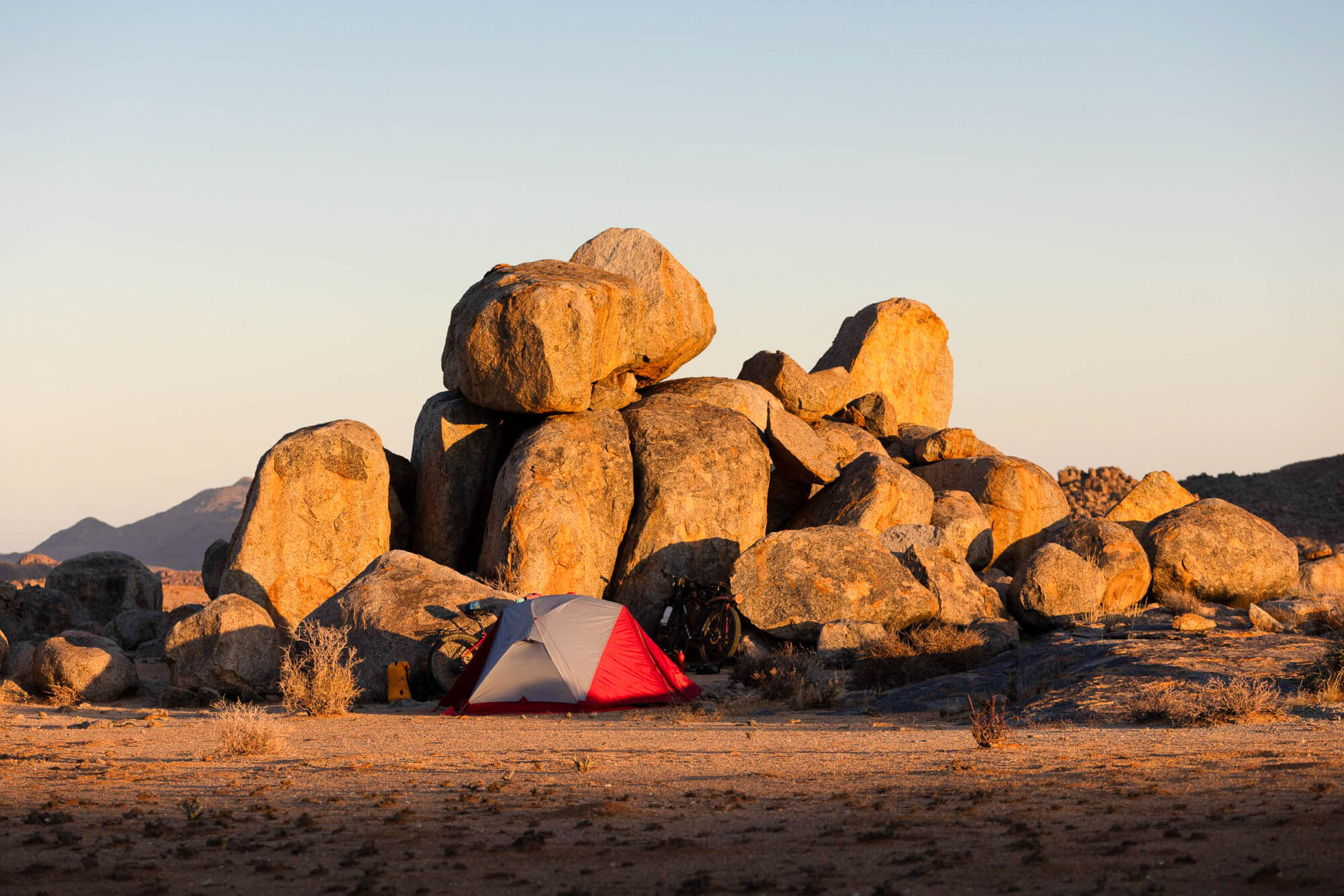
Though dry and harsh, the desert is stunning. It’s a photographer’s dream: clean compositions in simple yet perfectly harmonious palettes of warm hues. There’s no visual clutter. It’s as though the landscapes were sculpted in a giant studio. I stop to photograph a lone dark tree. It’s boldly staged in front of gently folding dunes that are lit by the still soft morning light. I’m pleased with the result.
At midday, we begin looking out for a shaded lunch spot, but it’s not until much later that we reach something suitable, a large Kameeldoring tree in a dry river bed. We unfold our foam mats to cover the thorns in the sand and enjoy processed cheese slices on dry wheat biscuits. The sun stings all but those parts of us that are meagrely covered by the tree’s perforated shadow.
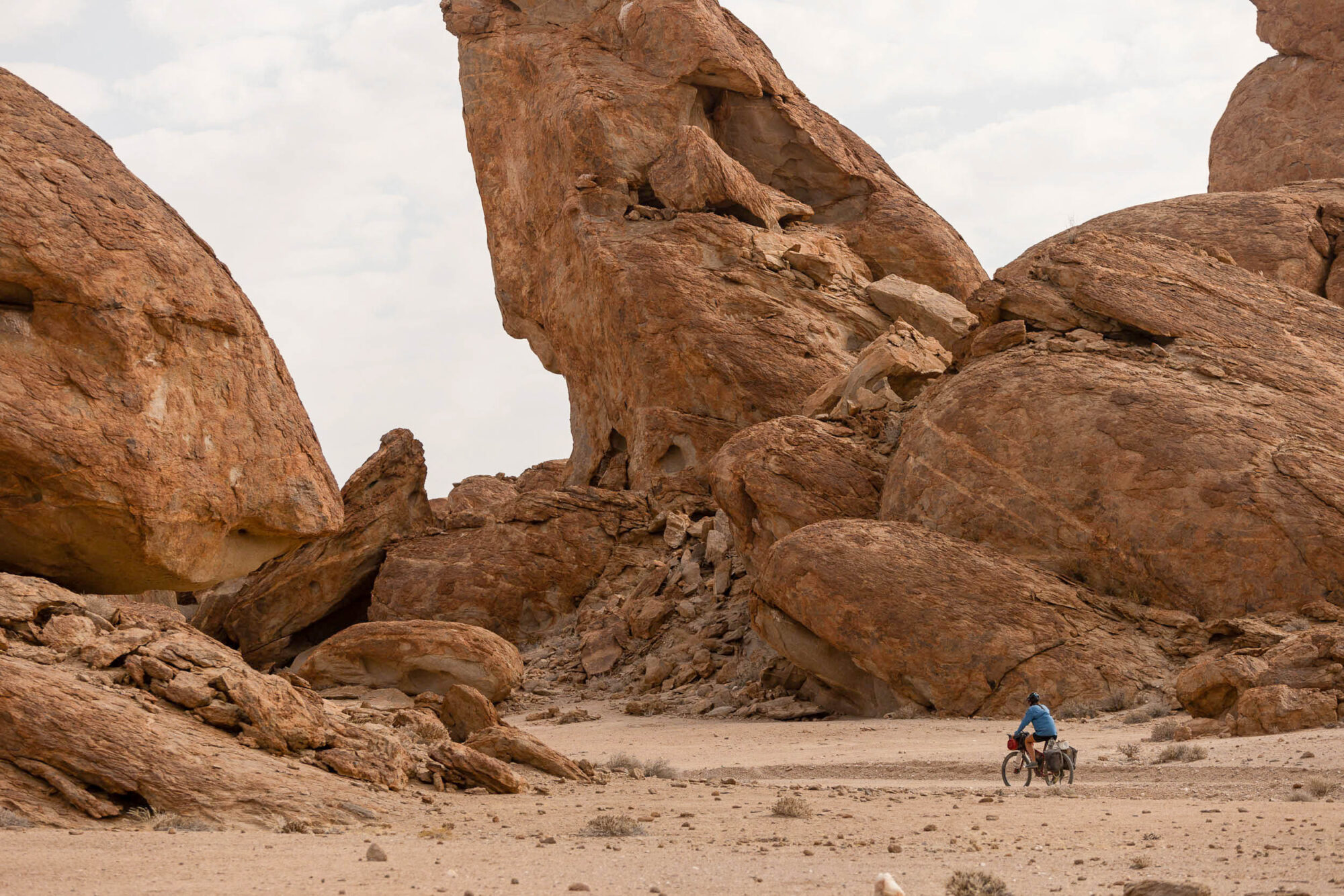
At dusk, the sky turns to a warm red as the sun’s last rays scatter through the dusty atmosphere. We pitch our tent once more, this time at the foot of a lone rocky outcrop.
By the time we concluded our ride in Namibia, the desert was thoroughly etched to our beings, and we would carry this narrative with us for better or worse.
A New Chapter
The next big adventure I dreamed up was a circular route through the Caucasus (Georgia and Armenia) and the Kurdish regions of Iran and Turkey. The start and end point of this would-be route was Georgia. When we arrived in Batumi, a city on Georgia’s Black Sea coast, we were energised and excited to be back on the road after a six-month hiatus from bikepacking.
In the city, we avoided riding through puddles on our still-clean bikes. It was raining, and the scene was totally novel to us. Soaked washing hung from the windows of the tall apartment buildings that line the streets. On the pavement below, vendors conducted business under the cover of tattered plastic tarps. The air was filled with the sweet smell of pastries and fresh breads, the names of which we were yet to learn. Shopfront names and notices were written in the illegible, curvy, Georgian script, but generously supplemented with photo images of the products on offer. Around us, the mixed chatter in Kartvelian, Russian, and Turkish languages all blended into a melodic hum that harmonised with the pitter-patter of the rain.
When I met the eyes of a passing elderly man, I momentarily strained my thoughts to recall the the basic greeting, გამარჯობა (gamarjoba), that I had tried to memorise on the plane ride there, but I stalled. Instead, my mind spun back to that previous trip where, in our home language, we could communicate seamlessly with nearly every person we crossed paths with. I was suddenly struck by how foreign it all felt.
This realisation continued to assert itself in the weeks that followed. Time and again, we were reminded of the various dissimilarities. Here, instead of mulling over our own conversations like before, we met and conversed with scores of other travellers and locals. We alternated between camping and staying indoors, allowing our perpetually wet gear to dry out.
We could lounge and wash in fresh mountain pools almost daily and never felt the need to carry more than a litre or two of drinking water. Fresh streams and spigots presented themselves almost hourly. Food was abundant too. Gone were the days of hogging a can of chickpeas, saving it for desperate times. Each little village had at least one small market store and a bread shop. Most food was delicious and nearly always came paired with drinking and friendly conversation. It’s possible that we even picked up some weight–something that would have been downright impossible on our previous long trip. Could the contrast be any starker?
Georgia’s mountainscapes are impressive. They present themselves hierarchically: Glaciated peaks to the north dominate the landscapes but are often concealed in angry clouds. Beneath them, the boundless grassy hills rule supreme. The hills are served by the forested valley walls and meadows below that finally foster the region’s life-giving rivers. Human settlements take a humble bow to nature’s harsh constraints and unimposingly subside in but a few of the land’s inhabitable nooks and crannies. It’s a landscape made for bikepacking.
Mighty and picturesque as they were, these scenes were a long way off from our desertscapes at home. I noticed this especially through my camera’s viewfinder. Objects competed for importance. The colour palette, too, was overwhelming. I struggled to find order in the clutter of trees, mountains, and foreground texture. Very few of the heaps of images that rapidly filled up my memory cards met my satisfaction.
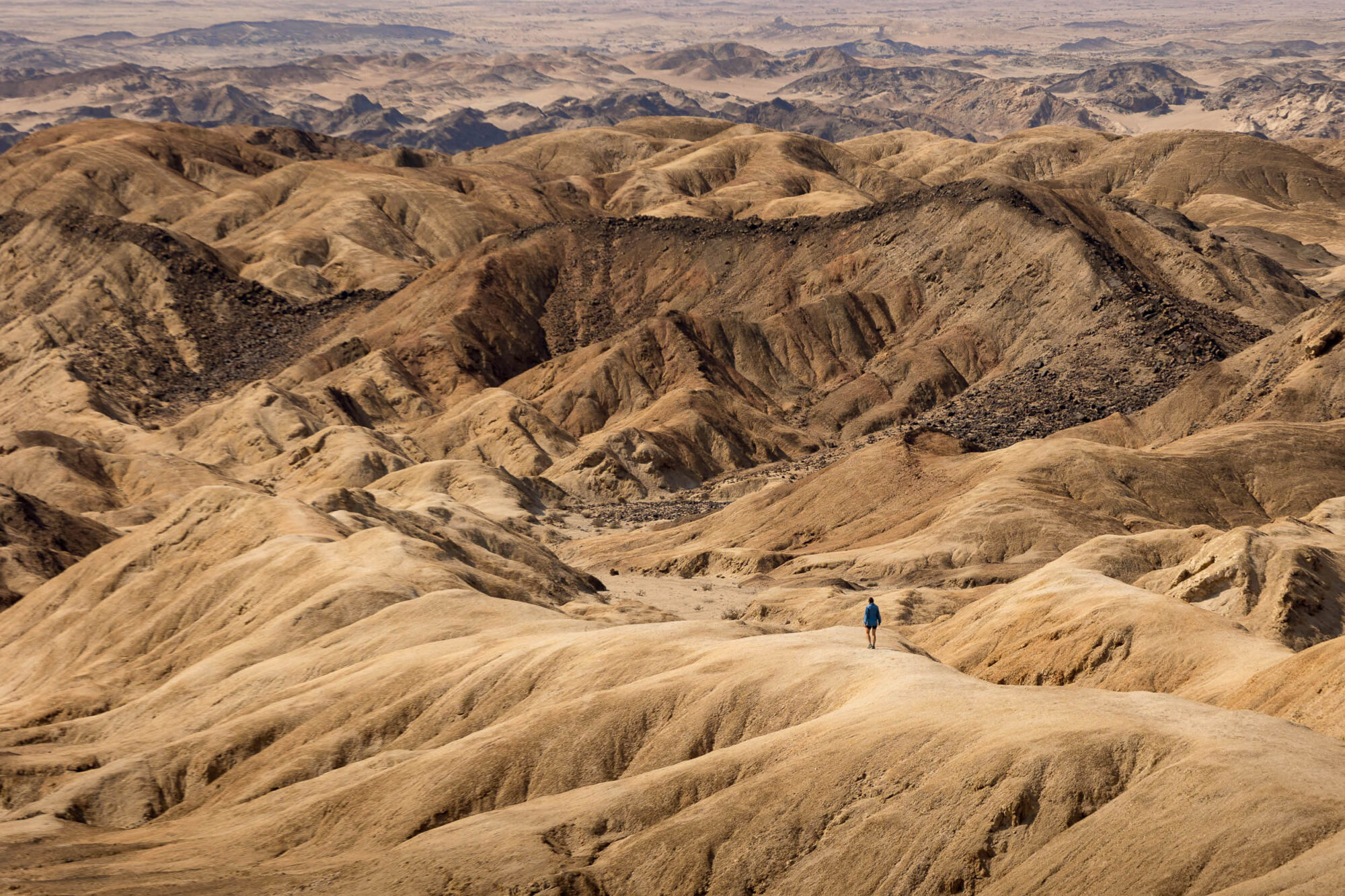
In this way, I was engaged in a continual mental tug of war. The Caucasus versus the desert. Which is better? Southern Africa, the underdog; or Georgia, the well-travelled gem of the Caucasus? Always looking. Analysing for noticeable differences. Calculating. And while we kept moving forward, the experiences piled up faster than I could process them. This unnecessary mental baggage was unfairly defrauding us of the enjoyment that the experience was meant to offer. But why?
Why did any of these differences even matter to us? So what if Georgia transgressed on our African desert narrative? Isn’t that the reason we travel in the first place; to experience change and open up our minds? I wasn’t able to pin it down then, but here’s the thing: Change is a bugger, and it got the better of us. Seasoned travellers as we thought we were, we were unable to fully embrace the change.
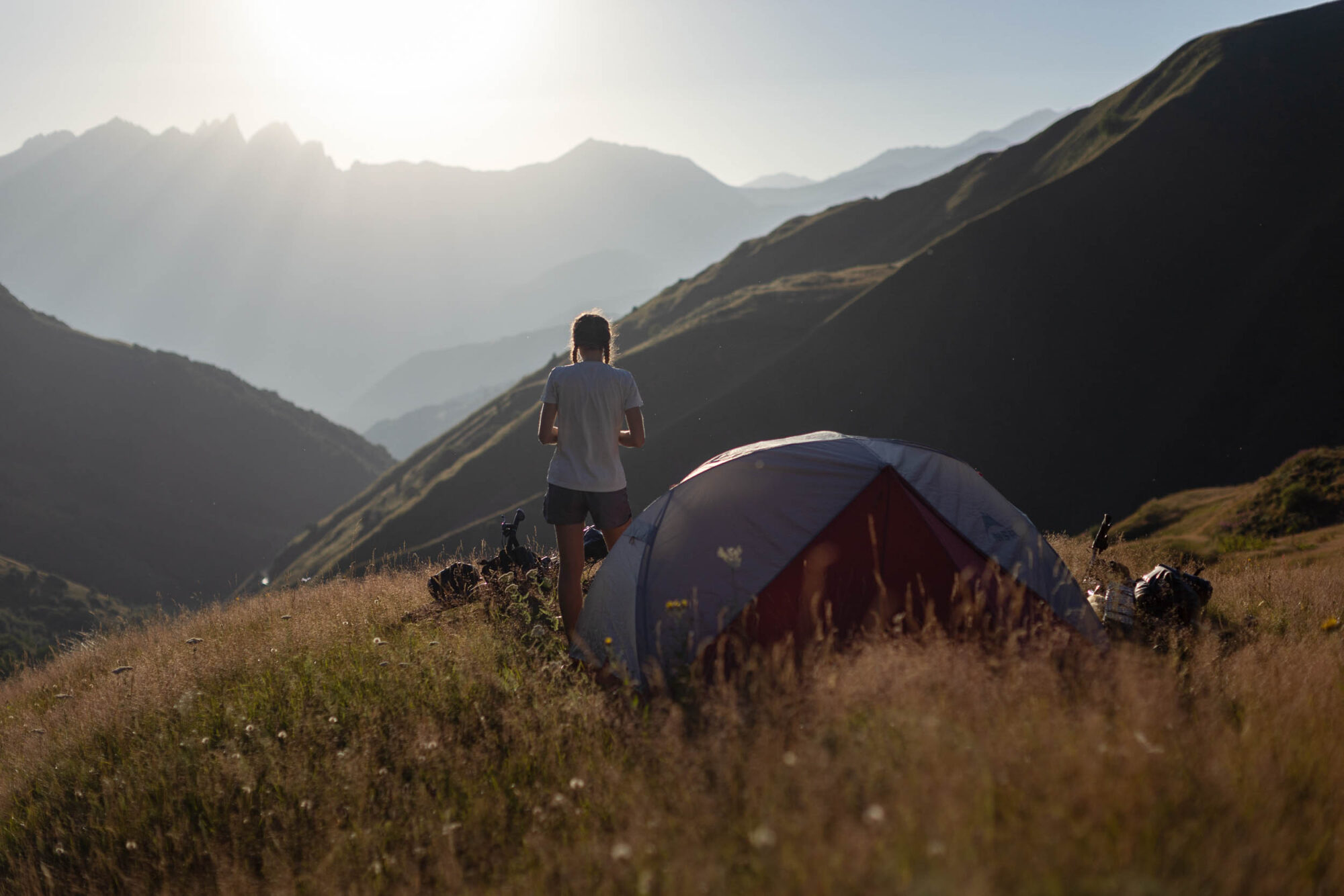
There we were, not even a month into our long adventure; I was sick as a dog and both of us felt burnt out in a place that still felt overwhelmingly foreign to us. Knowing we had no choice but to continue pedalling, I gathered what I had left in me and we made our way listlessly to the village below to fill our bottles ahead of the climb. In the village, I sat down on a low wall while Jana went off in search of water. It was while she was away that some kids must have spotted me, the ill foreigner, with my face in my arms.
When I looked up, a whole crowd of curious and concerned villagers had gathered around me. They could see I was sick and seemed to want to help me, but I felt irritable and wanted nothing more than to be left alone. They each had their own idea of how I would be cured and spoke loudly over one another as they suggested remedies. I didn’t understand much, but the common theme was obvious: they wanted me to eat, which was literally the last thing I wanted.
One man offered me a piece of bread, all but pressing it against my lips, but I resisted. This provoked confusion and the ramble within the group became quite frantic. The frenzy was adding to my state of nausea, and I was about to launch a projectile counter attack when I felt a gentle hand on my shoulder and met the eyes of an unassuming middle-aged man. He had kind, caring eyes that immediately inspired me to trust him. He gestured for us to follow him. Rafiq was his name.
Rafiq took us to his home where, for that day and the next, he and his wife took us under their wings and cared for us like family. It didn’t matter to them that we were dirty and unsociable. The care was totally unconditional. They offered up their own bed for us, and I was excused from eating for as long as I lacked the appetite. Meanwhile, in the cooking shed outside, Jana was offered a feast of traditional Azerbaijani cuisine (Rafiq’s family is from Azerbaijan). I was allowed to just lie on my back and rest–the one thing I needed most.
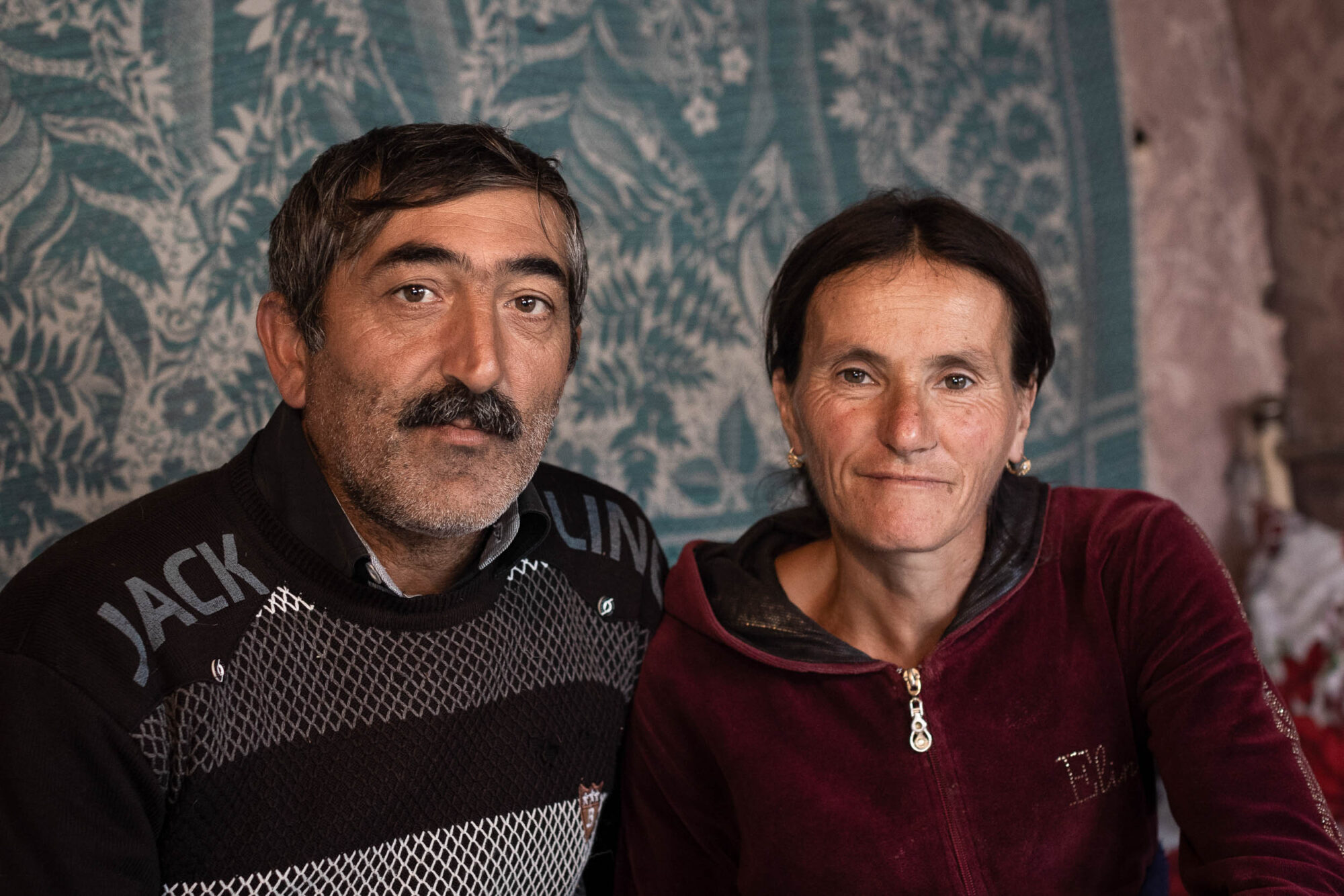
By the end of our stay, it felt like we had connected with Rafiq’s family in a way that we hadn’t, up to then, connected with anyone else in the country. It was a truly heartwarming experience. There was a light drizzle when we said our final goodbyes. On our way out to the road, I caught sight of something that beautifully encapsulated our stay: On a rough wooden board in front of the cooking shed, only partially sheltered from the rain by the shed’s decaying roof sheets, stood a proud hen. She was brooding her chick, completely covering the little thing under her extended wing. I felt immense appreciation as I likened this image with the time we spent in Rafiq’s home.
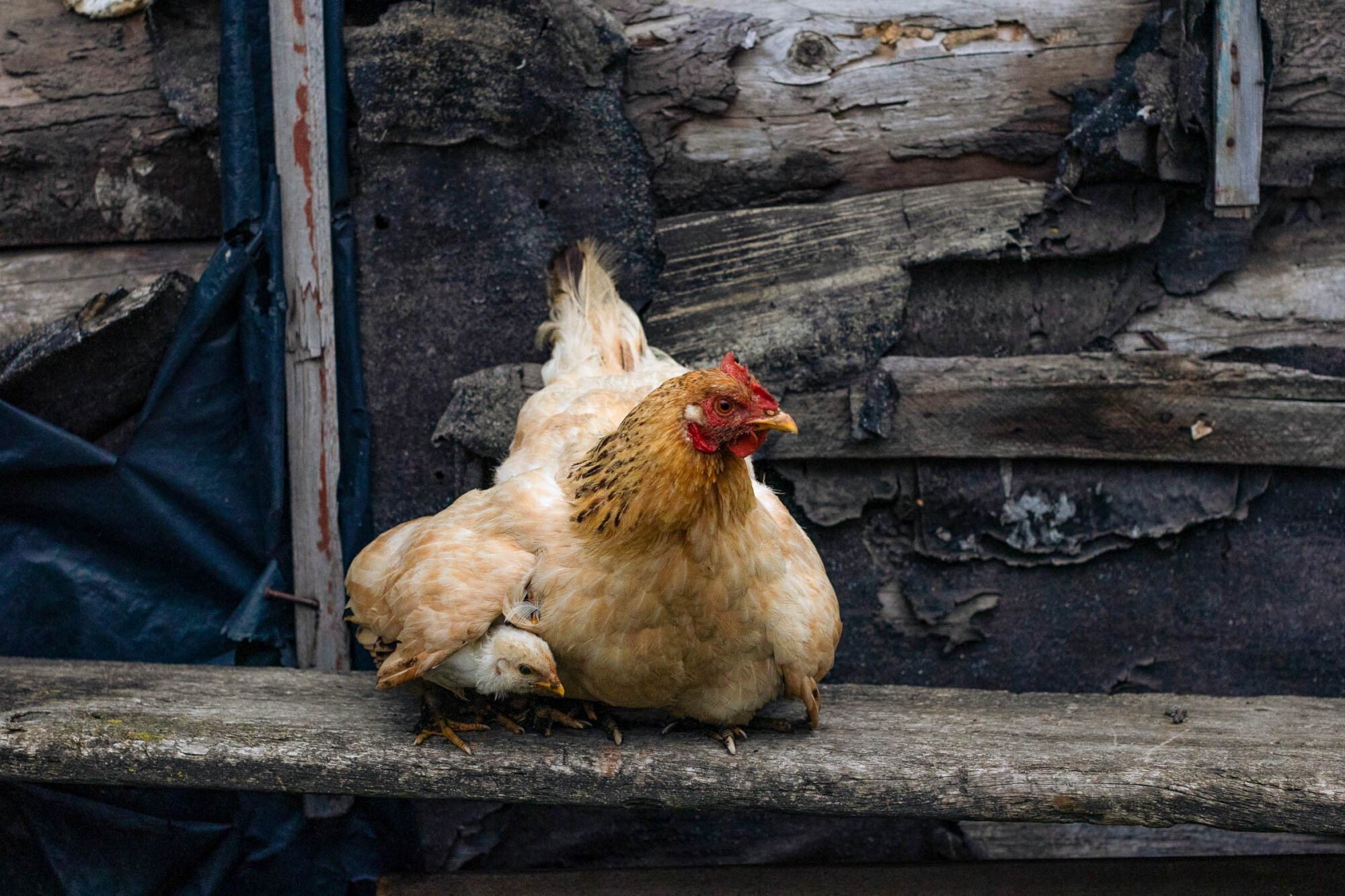
Presence
Later that day, pushing my bike up the steep, grassy hills, I felt light and refreshed. I felt welcome on the hills and less estranged from everything. Something in me had changed during our stay with Rafiq. It’s as though the way we were accepted and cared for was reflected in my attitude. I had made a connection with the place and no longer felt the compulsion to compare it with previous experiences. I felt at home. I accepted that our experiences in the coming months would continue to diverge further and further from the familiar, but I felt ready to take the deep dive in.
The contrast was still no less obvious than before, but I could lay that constant, nagging reminder to rest. It was time to enjoy the Caucasus. I smiled to myself as I pushed to catch up with Jana, who was waiting up ahead. When I reached her, she was gazing back down at Rafiq’s village in the distance and smiling exuberantly too.
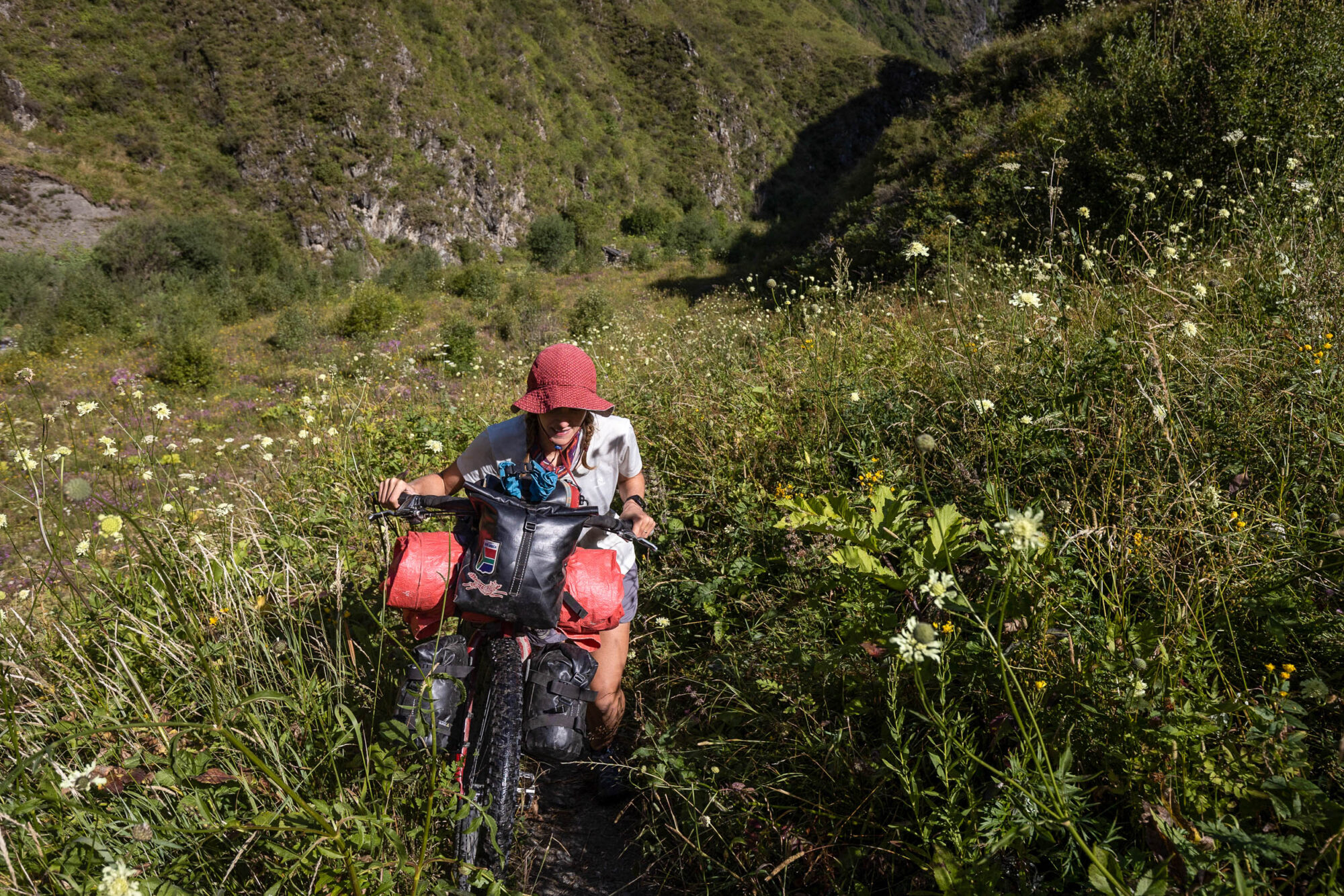
Breaking through that mental barrier happened just in time. We were approaching the physical crux of the route, Tusheti. It’s a remote region in Georgia’s northeast, almost completely isolated from the rest of the country in its extreme geographical location. It’s sandwiched between steep mountains with only two possible routes providing access: Abano Pass, the main route used by cars, which is demanding nonetheless; and the infamous Atsunta Pass, a difficult hiking trail. It’s a popular but coveted linkup for bikepackers to complete a linear crossing of Tusheti, entering through Atsunta Pass and exiting on Abano, or vice versa. On Cass’ route description, he warns that the Atsunta crossing is “extremely gruelling,” and we’d done enough reading up to know that we were in for a tough time, but we were still not fully prepared.
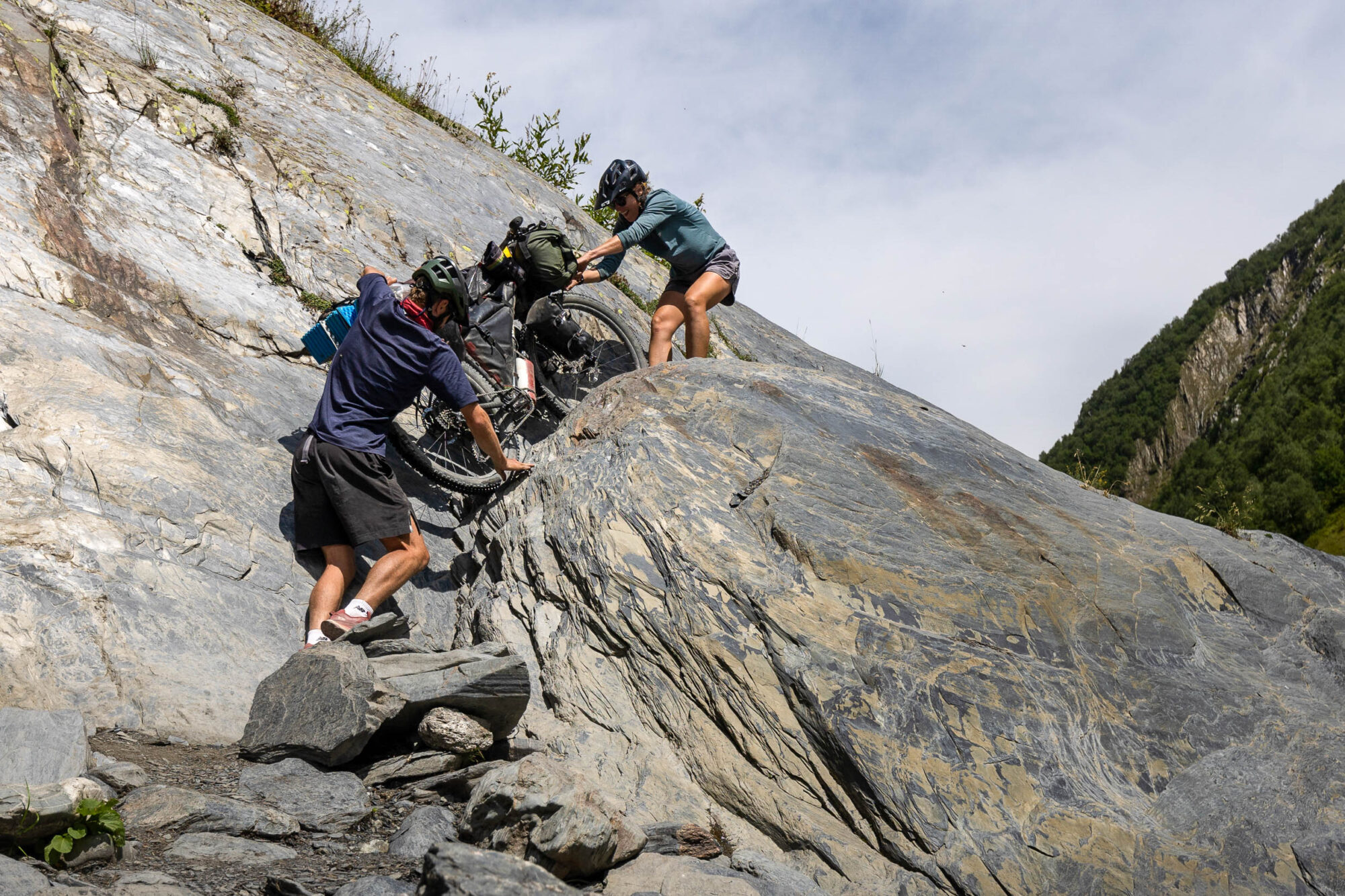
I’m not sure if I should be embarrassed or proud to disclose this, but the 25 kilometres from Ardoti to Girevi—the hike-a-bike section—ended up taking us three full days to get through. When we weren’t stuck at river crossings, we were stuck in dense foliage getting burnt by nettles. When we actually moved, it was mostly in vain, because we had to do most of the steep sections twice, Jana carrying bags and me pushing the bikes, one at a time.
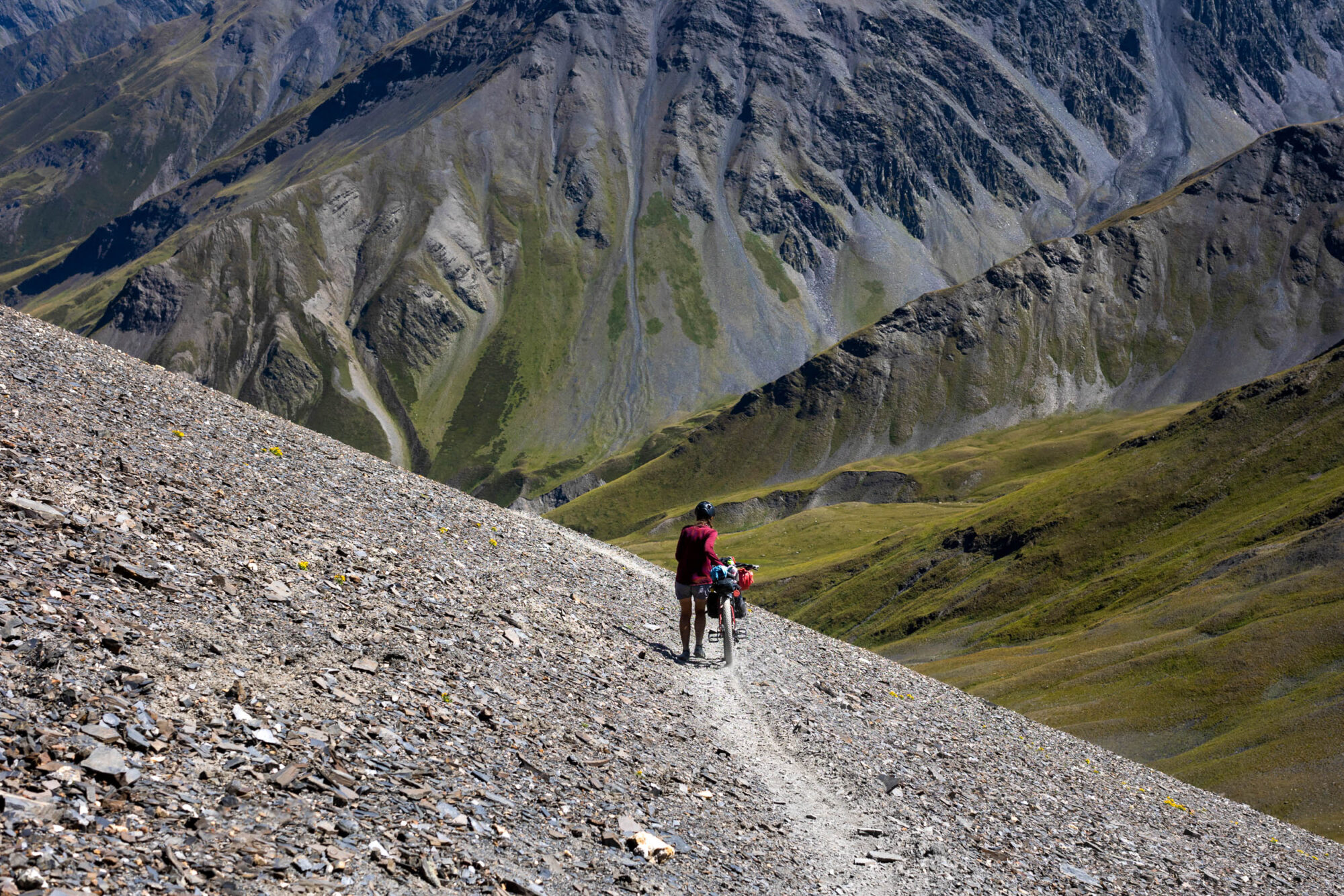
Our bikes were hopelessly overpacked for the crossing. We’d packed for a multi-month trip that would eventually stretch into winter on eastern Turkey’s high plateaus. The short, technical crossing of Atsunta pass in midsummer was by no means our only packing scenario. If only! The sight of our fully loaded bikes on that trail must have been as priceless to the hikers who passed us as the surprised looks on their faces were to us. We were astonished when, twice, we met other cyclists on the pass. We gave them our genuine sympathy and laughed together at length, amused by the precariousness of our respective situations but even more by Cass’s sandbagged description of the trail, saying that it’s “largely rideable.”
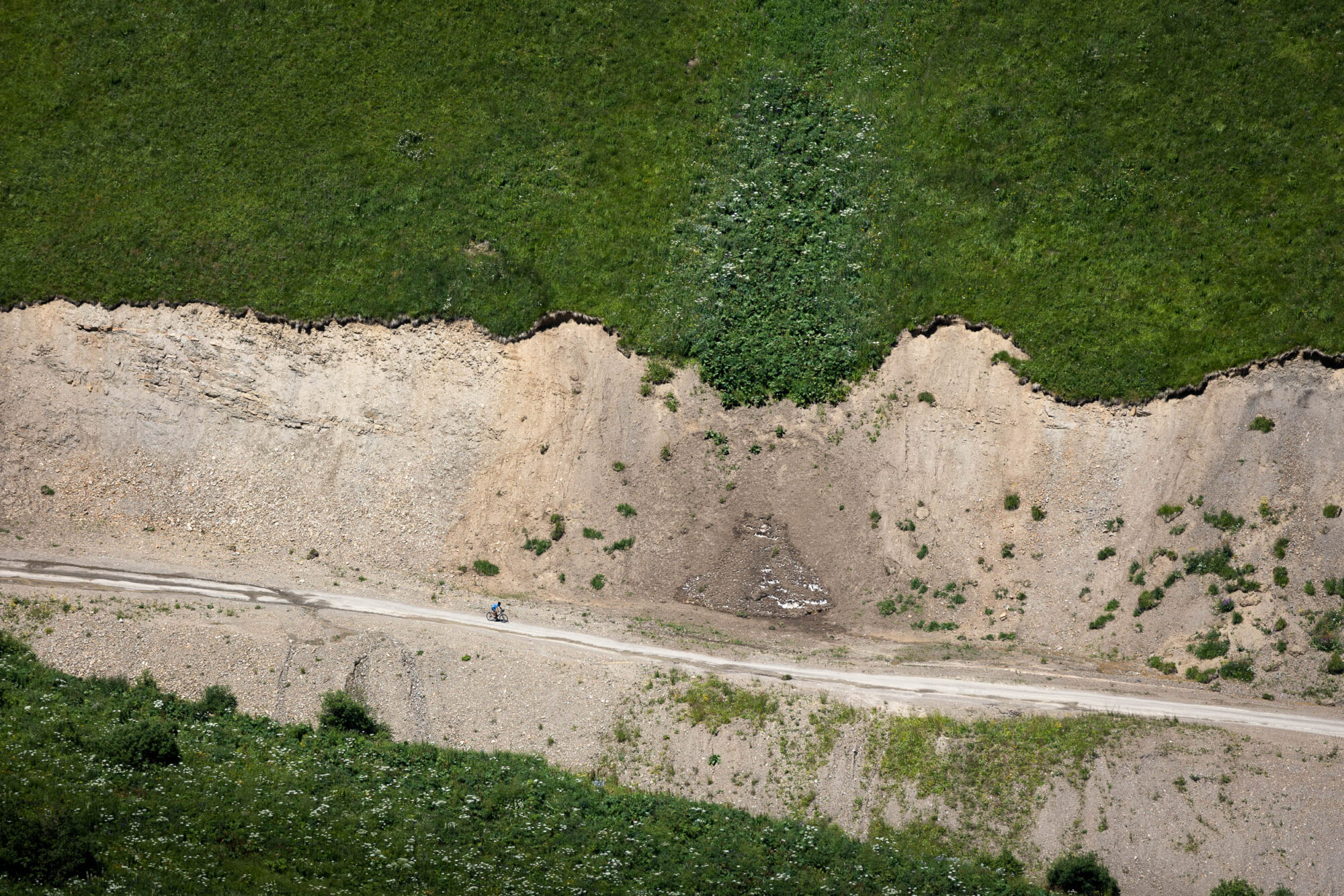
What an amazing adventure it all was. From building makeshift bridges to hauling our bikes up against rocks, Tusheti had everything. The scenery was incredible too, and the wild camping was the stuff of dreams. We were so immersed in the adventure that we failed to even notice, this time, how contrasting our surroundings were to those of our past travels. Had we attempted the crossing in the mindspace that we were in before meeting Rafiq and his family, we may well have had to call an early end to the trip. Without a positive outlook and our sense of humour intact, I don’t know how far we’d have gotten.
Georgia is nothing like the deserts of Southern Africa that we toured though in the past. Culturally, geographically, and climatically, they are worlds apart. At first, we got hung up by the differences, allowing them to eat away at the experience we were after. It took a near burnout and a heartwarming stay with a local family for us to embrace everything the country had to offer. I’m grateful that we persisted. At the end of the day, we certainly came away richer. Our memories of the desert are as fond as they ever were, but we now have rich memories of the Caucasus too.
Related Content
Make sure to dig into these related articles for more info...
Please keep the conversation civil, constructive, and inclusive, or your comment will be removed.




